#i initially wrote down this quote because of how beautiful it is
Explore tagged Tumblr posts
Text
The Enemy’s Embrace
a/n: This doesn’t really has any big background. I saw a book quote on TikTok and thought that the scene would fit so well in a yandere scenario. So I wrote it! Hope you guys enjoy it :3
Warnings: Yandere, Mention of Stalking, Mention of unconsenting actions, Mention of Killing, Soft Yandere
»»———————— ♡ ————————««
A shuddering sigh escaped your shivering lips as your gaze fell from the lattice above your head to the cell bars keeping you locked inside the cell.
There were so many things wrong with you being thrown in the dungeon. You didn't commit the crimes you were accused of and never fought the guards to deserve the resentment they've harbored. They had been downright glad to deliver you into the outdoor cell despite the early-winter cold setting in already, telling you you 'deserved' it.
Why did this happen?
Even after days, you lamented the questions of why and how, but the realization—a realization that made you angry beyond measure, furious and wild—had long set in. No matter how much you tried to ignore it for the sake of your own sanity, it wouldn't let you forget the reason you were here.
Not least because the reason kept talking to you with an awfully smug grin on his face as he waited for you to break.
"I don't mind sharing, you know?"
"I know," you mumbled, turning your back towards your cellmate and hitting your head against the cold stone to remain composed. You knew. You knew so well. The man wouldn't stop talking, belittling you with every word he uttered. And you knew he didn't mind sharing at the cost of you giving in to him.
It was driving you mad.
Glancing back over your shoulder, you watched your arch nemesis, the man you hated most in the entire world, flap his beautiful fur coat into the air, exposing the free space he had underneath to spare for you. That was if you could lose your dignity and sit between his legs, allowing this awful man to envelop you in a warm embrace.
He was grinning, as always, when he caught your eyes. Smugly. Challenging. Aware. Aware that you were slowly freezing to death in just your clothes while he had cozily bundled up in luxury unbefitting of a prisoner. He had been here longer than you, thrown into this dungeon for his crimes before they even came to get you. Someone took pity on the man who presented himself oh-so-dramatic and charming when he wasn't an insane villain. He just had to wail to and flirt with some of the noble ladies passing by the lattice until one of them decided to drop the poor man such a fine fur coat to survive the cold.
It wasn't like he could come near you or hurt you again from his position, bound by chains around his wrists that weren't short enough to immobilize him but not long enough to walk away from his spot. But even after all this time, he still enjoyed the torment of your suffering; every breath you blew against your icy fingers sending a shiver of excitement down his spine.
Sadly, no one thought of gagging him as would be appropriate for a notorious liar. Though the court believed you initially when you told them about his misbehavior—the following, the touches, the murders all in your name—somehow, he convinced them that you weren't an innocent part in all of this. There was nothing you could have done to convince them of your innocence after he charmed his way into the hearts of the jury with fake reasoning and pleading for justice. He opened his mouth, and everyone played his game—except you.
For these reasons, you hated him. And for your rejection, he loved you.
He could have had anyone, even a noble knight or the princess of the kingdom. But he wanted you, specifically, and preferably on your knees, begging for him. His taunting invitation to a warm huddling under the fur was just another way to torment you. He simply wanted to have you just because he decided you belonged to him, and crush your mind to fill it with the same insanity as his.
You had fought him for years. You barely escaped him on so many occasions. But while it had felt like victory to see him being dragged off by guards to his new home, the outdoor cell you hope he'd never escape from, in the end, it had all been in vain. And as you stood in the cell, facing the grey stone wall, this realization was the hardest to accept in all your life.
Because you were really fucking cold.
Even if you had thought about the possibility of yourself dying while getting rid of this lunatic, the thought still pained you. Things had gone wrong many times, but you always made it. You wanted to live. You fought so hard for your freedom and to survive. How could you possibly just throw it out now and allow him to lure you into his grasp?
"What must I do to make you come here and stop being so wary of me? When have I ever done something for you to hate me so?"
Even when he let out a defeated sigh before he spoke, his voice was nothing but mockery. He once again played the role of a savior. A gentleman, a soft-hearted soul in a cruel world. He was right that the world was a cruel place, especially for a genuine and kind person like you. But if you needed saving, you didn't want it to be from an actor who played the role of the selfless hero while grinning at the blood on his own hands.
"I'm good," you replied coldly, much like you were feeling. Hugging your body, you sunk to the ground, rocking yourself back and forth while trying to ignore the annoying villain on the other side of the cell. Closing your eyes, you tried to imagine the summer sun shining down, warming your skin instead of the cold winter breeze ramming into you. Things would have been much easier if he had stopped talking.
"Not to unnerve you, but despite always being stunningly beautiful, the color of your lips is slowly making me nervous, too. We both know you are freezing."
He just wouldn't shut up.
"I. Don't. Want. You. Near. Me," you repeated the same phrase you've been telling him from day one. A phrase he usually liked to ignore and keep sputtering. However, not this time, and suspicion forced you to open one eye to see what he was doing as he didn't reply.
He was simply staring at you. Blankly, unnervingly. You had to look away because his unblinking eyes were unsettling to look into, wide like those of cats staring at an object of desire but void of the empathy of a human.
"Frankly, I don't care what you want," he muttered quietly, barely audible over the howling of the wind. "But if I beg you to come here and let me warm you, will that help? Would you stop torturing me with that pitiful sight of you if I pleaded and said 'please' and 'pretty please'? If I could, I would already be by your side regardless of if you'd let me, but don't you have pity on me, too? Pity on the man who has to watch the love of his life slowly freeze to death while he can't do anything to save you?"
You were so tired of his tirades. The endless amount of garbage he spoke as easily and freely as a bard sang of overdramatized adventures of heros without flinching about their lies. "Please," he breathed. "Please let me warm you."
Another shiver ran through you—from the cold or the desperation in his voice, you weren't sure—but you didn't move from your seat. Didn't give him the gratification of acknowledging him even if your body began to burn from the cold. You heard the rustling of chains, and when you finally looked up, you could see him twist and turn his wrists in the cuffs, trying to loosen them somehow. Only when he noticed your gaze on him did he change from fighting the restraint to giving in.
Letting his hands sink to the ground as far as the chains allowed, he kneeled on all fours before reaching up one hand, ignoring how the cuff cut off the blood flow to his hand. He could never reach you, but he was still trying. No matter what, he never ceased to pursue you, even in the most impossible situations. It made you shiver even more to know the person that selfishly claimed you as his, had the determination of a starving lion to get what he wanted even when he was chained and immobilized.
"I'm begging you," your enemy emphasized. "I'm begging you to let me help you. Let me hold you, so we can survive this together—or die trying. Together. Don't die so far away from me where I can't reach you. Can't even follow you... I can't even hold your hand. Please don't leave me like this. Please just... forgive me. Have mercy on my unworthy, oppressed heart."
Your eyelids were growing weary from the cold, and your mind even more so from his words. But as your movements slowly stilled, conflicting, old thoughts came to mind. Thoughts that you had chugged into the deepest drawer of your mind after he had been imprisoned. Thoughts you hoped never to have to resurface.
I'll survive this. I can escape him no matter what happens. This is not the end.
Slowly, weakly, your arm stretched out. The realization turned your enemy's expression into a surprised one, then he lept forward, ignoring any restraint and the impact on his body as he reached for your hand. His fingers barely grazed yours, but as you collapsed forward, he managed to snatch your wrist, keeping your face from hitting the dirty ground you two were seated on.
And before you knew it, you were enveloped in warmth.
He shifted all around you for a while until your feet were tugged in and under his legs, body covered by the fur and his—probably hurting—arms, one hand holding the coat closed around you so no draft could touch you, while the other one pressed your head into his chest, his chin resting on top of your hair. Completely absorbing you into the little warm orb that was the world he lived in.
"Finally," he sighed, turning his face downwards to nuzzle it into your hair, ignoring the grime that must have built for days. As if nothing about you could scare him off. He didn't seem bothered by anything as long as it concerned you, but you ignored anything he did for once, letting out a long sigh as the warmth slowly thawed you.
"You're not getting out of this one," he mumbled, planting a reverent kiss on your head, filled with the fulfillment of his longing for you, drawing it out as long as possible. Hand reaching up, he cupped your face and warmed your cold cheek with his palm while his thumb caressed you as if you were the most precious object he ever held in his grasp. "I finally have you," he muttered, and you couldn't help a weak huff as the words ever so softly reached you.
"You can't escape me now. You're all mine. Finally. I waited so long for the day you'd finally give in to me. I'll get us out of here, and you'll never have to want for anything, I promise. I'd do anything for you. You know that."
You simply let him keep brabbling while he kept you warm. Fearing that if you refused him now, he too would reject you. That this really would be the end despite all the hardships you had overcome up to this point. You felt nothing of the worship he felt for you, for him, but if this was the only way to stay alive, you'd bite your tongue and let him confess a million more of his crimes to your ears only. You'd overcome this all the same.
You'd survive this, too.
But for now, you'd be warm, cradled in your enemy's embrace.
#yandere#yandere imagines#yandere headcanons#yandere scenarios#yandere fanfiction#yandere writing#yandere stories#yandere oneshots#yandere oneshot#yandere drabble#yandere x reader#yandere x darling#Yandere TW
1K notes
·
View notes
Text

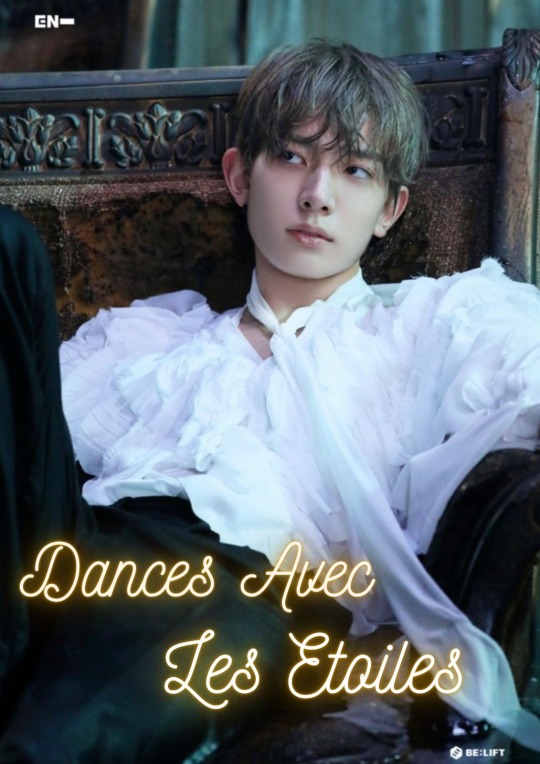
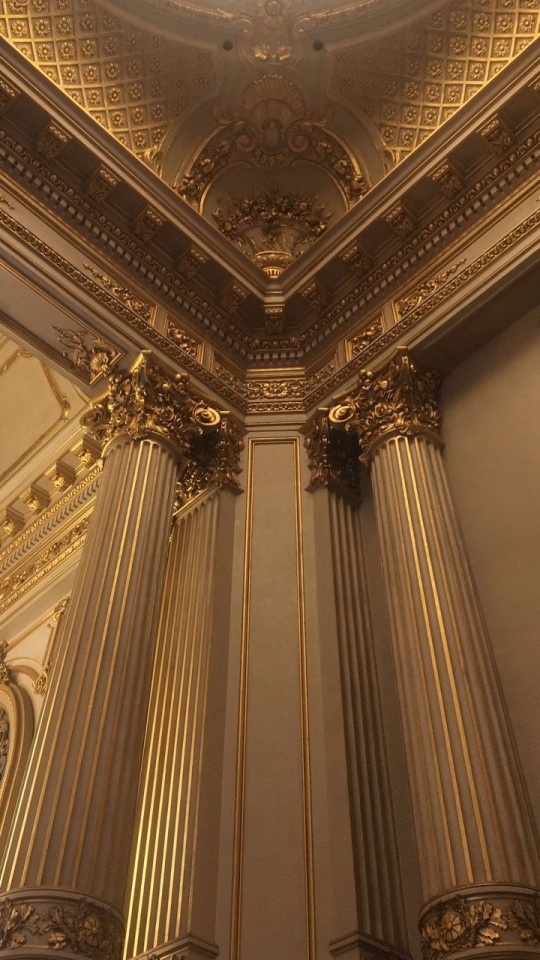
Dances Avec Les Etoiles ft. Heeseung - The Vows
Synopsis: God how boring is love? For Lee Heeseung, it was perhaps the most boring thing in this rotten world. But for his parents, it meant buisness. And buisness meant getting Heeseung married off to a princess from another kingdom. And when the princess shares a peculiar interest, Heeseung starts to believe in Cupid again.
Pairings: Prince!Heeseung × Princess!fem!reader
Warnings: literal fluff nothing else, vows and a wedding my baes!!!
A/N: I HAD to write a wedding scene like COME ON its a law in Mona town that you cannot not write a wedding scene. Also I wrote really sappy vows so sorry not really that @candewlsy babe your daddy papi is a lovesick daddy papi now hehe
Part 1 || Part 2 || The Wedding
The French Quotes Series Masterlist
Weddings were always thought to be pompous events, jewels, dresses, champagne, whose son married whose daughter, gold, silver, and most importantly first dances.
And Heeseung couldn't have been more impatient for his first dance than ever.
Although it wasn't his first dance with you, having danced with you with every passing second of time since your engagement was officially announced.
He had sneaked you out often to the western wing, much to the suffering of Sunoo who had to hear Heeseung's rants about how pretty you danced with him.
And now it was suddenly the wedding, how the time had passed so quickly, and how, now, you were all dolled up in your flowy wedding dress, with adornments on you, enough to last a time. But the thing that shone especially bright was the rose gold ring on your finger, which Heeseung had customised for you. A ballerina figure sat on top of the ring, a bit extra, but it was Heeseung, and you loved how he had your initials engraved on the ring.
And then there you were again, walking with slow, flickering footsteps down a carpeted aisle to Heeseung.
Your Heeseung.
Your dancing prince.
You had often heard of the notion that brides shouldn't ever cry on weddings, it was apparently bad luck.
But how could you have held yourself back? When your ears listened to the beautiful notes of Heeseung's voice reading his own, written vows, a first for Tarnow's royal weddings apparently. But how could he have not? His princess deserved more than poetry. Especially when vows weren't usually allowed for princesses so usually the groom had to take incharge of the "how much I love you" banter.
"Beautiful." Heeseung whispered to you as you stepped onto the pedestal, facing his handsome face, "You look beautiful."
"As do you, my prince."
The priest clearing his throat snapped Heeseung out of his daze, while he was staring at your exposed neck and collarbones, god he hoped he didn't have anything particularly visible.
"Right." Heeseung took a deep breath, and took his paper from a very sweaty Jay, who was looking at you with a "Thank you for falling in love with him" smile (as if he hadn't thanked you enough already).
"I-Im kind of bad at writing vows and everything. Not like I've written them before! Because I-Ive never been married before I mean-" Heeseung panicked, but immediately calmed down at seeing the smile on your face. You placed your hand on top of his, earning an "aww" from the guests and a smile from Heeseung, who took another deep breath and started.
"Princess Y/N of the Witchelm Kingdom." Of course the declarations had to be first, "Have you ever heard of the sentence, Dances avec les etoiles?"
His voice bought a blush to your face.
"It means to want to dance with stars. When I was forced to learn french at eight, I found out about this pretty poetic line, and I related to it greatly. A little too greatly perhaps, and I found myself dancing in the darkest corners of this palace every night. It gave me peace, a lot of peace, to see myself in a great big mirror and do what I could never do to the strangers in the outside world."
You swore you could see stars dancing around Heeseung.
"But then, you came into this thing I call my life, and for-for perhaps the first time, I felt complete. Yes, we may have bickered, too many times for your liking-" that incited a giggle out of you, "But even in that, even in your anger, I truly found beauty in its equality. And when you danced for the first time at the ball? Oh god I swear I could have ravaged the earth for you right there and then, my princess."
You could have done the same for him at that moment.
"I had always thought of love as an insignificant thing, who would crave for a mere emotion like that? But now I realise, that it the only emotion I am ever so starved of, and it is the only emotion I feel, every single time your light shines on mine.
God do you know how much you dance like a swan in the corners of my heart I thought were unreachable? Because you do, you truly do. If there were a hundred universes in this world, I swear to find you in each one, and have one last dance with you, one last sinful symphony if it's the final thing I do, if your face is the final thing I see, then darling consider me blessed in my choices and cursed in my rendezvous.
I-I would be the happiest man on earth, if I was to dance with you every second, if my hand were you rest on your waist and twirl you around every day, I would truly be happy, Y/N.
I would be dancing with you among the stars, so much that the planets themselves get jealous, that their astral ballet cannot compete with ours."
You truly never knew the dance of two souls could have been more prettier than Spanish flamenco. But now, as your lips moved in synchronisation with Heeseung's, the sweet venom injecting into your lovesick blood, his hand ghosting your waist, as if he was afraid to even break you, you truly knew what love was.
It was to match each other's feet in the mirror of a now renovated western wing, dedicated to dancing and only dancing.
It was to make fun of Heeseung's brothers for their terrible dancing skills (barring Jay).
It was to simply exist with Heeseung.
It was to dance among the stars with him, as the saying went,
Dances Avec Les Etoiles.

Taglist: @amazzwon @heeseungshim @kvmariii @mwahvvis @hottiewifeyyyy @sacrificeatmeup @perfectnighttt @yawnzzhoon @yungnorth
#heeseung#lee heeseung#heeseung fluff#lee heeseung fluff#heeseung smut#lee heeseung smut#enha fluff#enhypen fanfic#enhypen fanfiction#enhypen fluff#enhypen hard hours#enha hard thoughts#enha hard hours#heeseung hard hours#heeseung hard thoughts#lee heeseung hard hours#heeseung × reader
170 notes
·
View notes
Text
Ok I saw a post before saying what if we put all of Nick’s characters in one room (I can’t find op anymore) and after the last reblog it got me thinking so here’s some weird multiverse imagination
Note that I’m only gonna use the characters I’ve seen/know about, so that’s Henry (RWRB, duh), Conor (Handsome Devil, watched the whole movie and really liked it), Timmy (The Craft: Legacy, only watched Nick’s part lol), Robert (Cinderella, the first time I actually saw Nick, I watched… enough, plus a bunch of video essays on it because I am a musical theatre person and a fairy tale person), Jeff (Bottoms, from what I can get from the trailers), and Luke (Purple Heart, which I love you Nick but I will not put myself through that, based on what I’ve heard about it and reading the synopsis on Wikipedia) if you can think of more please join in on this mess
Let’s say some weird random ass multiverse magic got all of them into a room. After the initial “Good God is that what I look like with a buzzcut?” and “Why the fuck are they British- is that kid Scottish?” and “HE��S A PRINCE? OH THAT GUY WHO’S SINGING IS A PRINCE TOO? HOW AM I A PRINCE???” then someone (honestly out of the six I listed probably Henry or … Luke?) telling everyone to settle down and introduce themselves so they can figure out their differences, what’s gonna happen?
Well...
Luke and Jeff will definitely get into a fight at some point. Maybe Robert gets unintentionally involved too
I dread to imagine the conversation/confrontation between Luke, the conservative marine and Henry, now a gay icon in a loving, committed relationship with the bisexual POC son of a democratic female president (I’ve heard some folks call Henry the rainbow prince and oh my God I love that) interacting, but Henry is still a prince and a lot stronger and willing to stand up for himself and his relationship at the end of the movie, I want him to win in that argument
Henry and Robert will definitely judge each other. Robert on Henry’s clothes and how proper he is (think about his fucking line “dancing at these things are so mannered! And formal! And we look like fools!” and oh God I hate that I can quote that line) and Henry on Robert’s eccentric, borderline-childish mannerism, and wonder how on earth is this guy a prince (I know royal protocols are strict and Henry does definitely find them stifling at times but a large part of that is just… manner and etiquette? Like look at the pained face he makes when Alex devours the cornetto and then speaks with his mouth full of ice cream, he was definitely exasperated by his choice of men at the moment)
Luke and Jeff will get annoyed at Robert spontaneously bursting into song and tell him to shut the fuck up, but Henry might find it amusing and somewhat charming (come on I absolutely don’t believe that Alex and Henry don’t sing to each other, especially when they have Taylor and Nick’s beautiful singing voice in the movie verse) and maybe Conor starts shyly strumming his guitar to Robert’s singing
Jeff trying to bully Conor and Timmy then realizing these boys are no less strong than he is and gets his ass kicked
(The next couple of points are the main reason I wrote this post lol)
Henry recognizing Conor and Timmy’s struggles, seeing bits of his younger self in these queer kids that look like him, remembering what Alex said about getting to be someone his father didn’t see growing up, thinking he can do something similar for these two boys and taking them under his wing, pulling the both of them to a corner to talk
Conor telling Henry that he doesn’t believe there’s a place in the world where he could just be himself, and Henry remembering feeling the same until a certain American boy with fucking eyelashes, black curls and dimples stormed his castle
Timmy explaining how he feels like his bisexuality isn’t being validated (Nick did amazing in that scene please go watch it) and Henry gently telling him that that’s absolutely not true and that his boyfriend is in fact, bisexual, and there’s absolutely nothing wrong with liking both boys and girls
Henry and Timmy sharing their grief over their lost parents
Conor and Timmy suddenly having a man who looks like them, who's in a position of power and in a committed relationship with another man in a position of power to look up to
Henry telling them his story and how he found love and support, giving the boys hope, and realizing that this is what making history can mean
I don’t know how my brain came to this but Henry as an older brother to Conor and Timmy now lives rent-free in my head, might write more on that alone
Very intrigued about how this is gonna be expanded when Mary & George comes out and we add George Villiers to the mix, Henry will pass out
#rwrb#red white and royal blue#rwrb movie#henry hanover stuart fox#henry fox mountchristen windsor#nicholas galitzine#rwrb thoughts#handsome devil movie#conor masters#prince robert#cinderella 2021#bottoms movie#not tagging a certain film because I don't want to deal with that crowd#please make this a thing this was so much fun to think about and write
67 notes
·
View notes
Text
WIP Tag Game
I was tagged by @chocochipbiscuit, who was embarrassed to have far fewer WIPs than this. Oh boy! Don't ask how many I have because this is still an incomplete list, I just gave up typing them out at a certain point 😂
Rules: Post the names of all the files in your WIP folder, regardless of how non-descriptive or ridiculous. Let people send you an ask with the title that most intrigues them and then post a little snippet of it or tell them something about it! Tag as many people as you have WIPs.
Okay I've organized this Overwatch WIPs first, all others at the bottom (categorized into BG3, Other, and Original)
Angela/Fareeha
engagement redux ● photos [nsfw] ● tu bishvat ● the big one ● pride six ● beach episode ● most mornings ● cisvestigating lol ● too close ● mariel bday [nsfw] ● augh [nsfw] ● again no [nsfw] ● aesthetic sensibilities ● funny? ● nervousness ● schedule [nsfw] ● couch ● fiber ● ethical objection [nsfw] ● nanobiotics ● a strange sort of freedom ● izzah boredom ● kinktober scraps [30] [nsfw] ● temperature play [nsfw] ● it's not the same ● not up for two [nsfw] ● scraps - no baby ● chance catches up ● event horizon ● something shifted ● colorblind shenanigans ● 07/24/2023 10:09 AM ● time tempered ● abdication of responsibility ● nebulous ● i don't actually ● initial shock ● repetition ● selbstzufriedenheit ● its different, its you ● youre making this very hard for me ● moon i think that its you ● rites of unshared spaces [nsfw]
Ana/?
tomorrow pt. 5 ● beautiful [nsfw]● topoisomerase [nsfw] ● ana leaving ● echo girl ● cairo [nsfw] ● undone, not quite young [nsfw]
Other Pairings
something is amiss ● whiskey dick [nsfw] ● agon pas de deux ● 100 and counting ● ground still tumbling down [nsfw]
Gen
ana izzah ● house - day 2 ● tangy ● envy ● change ● expectations ● izzah routine ● recovery ● what i would do ● shielded ● keen awareness ● inevitability ● touch-up/after ● six qs ● pre-partum anxiety ● bap non-binary ● oui'd ● adhab al qabr ● baby (there is none) ● therapy! ● 5+1 of the worst kind
BG3
kinktober [nsfw] ● shartzel bad end [nsfw] ● smtg healing [nsfw] ● the gang gets cancelled! [nsfw] ● quote from man owned: im not owned!
Other
gays anatomy ● scully im free at six pm call me scully scully im free [nsfw] ● josieviv [nsfw] ● apparently the worlds first osag fic ● chana please dont hate me
Original
below the gentle waters run ● like myself arrayed ● softest hours would choose ● lashon hara
Tagging @throughalleternity @foulbearobservation and @tahthetrickster. Sorry if you felt obligated to read all that because you got tagged because honestly I probably wouldn't read all that and I wrote it!
#txt#tag game#dont even look at me i know this is so freaking long aslkdfjasdlkfjas#i even left a bunch out!!!!#bitches be writing ;_;
3 notes
·
View notes
Text
Ep 7, finally! Sorry fellas took a while.
I will try to skip past the Despair destiel parallels since they've been mentioned often enough and focus on other stuff i find interesting.
Ok 1stly Carlos jokingly saying they should try jumper cables for the Ostium only to then look back at Lata judgingly was A++ friendship moments.
Love the Tony mention from Ada so much!
I will say all the shell company and warehouse talk reminds me of spn season 7 and the Leviathan plans which to be fair, the Akrida's plans are basically the same. Both hungry, some type of shapshifting beings. Kinda wanna know which came first for Chuck, cuz we know the Leviathan are meant to have been genuine creature vs the Akrida who were deliberately made as fail safe plague.
Mary big mad this ep beginning and it's all because of her worry.
God I still love the Akrida design and I also adore their growls!!! Tho I add that the fact that they can feel pain but cannot be killed save for something out of this world is hella intriguing, feels like something a, to quote Chuck, "cruel, capricious God" would do.
I adore Carlos brain! They're soooo smart and it's constantly shown in all the subtle ways but it's so consistent throughout that I love it. And not just generally, but also emotionally speaking, especially highlighted in the scene with Mary. Putting the right blame on the shifters, being honest about dealing or not with their parents death and still succeeding in bringing Mary's spirit up.
Why would John be so shocked that Henry would've written something for the MoL? Henry was a MoL so it really shouldn't be that surprising that he wrote stuff down. I personally think it's because he chose not to ask more questions because it would've fucked with him too much and he couldn't handle it.
Millie in the Clubhouse! Finally! She's still too harsh, but this time I tend to give her tiny bit more benefit of the doubt since it's obvious being in the Clubhouse is bringing up all the very complicated feelings she has deliberately not dealt with about Henry. It's why she can go from mentioning love letters with a soft gentle loving tone one moment and then insulting Henry's chicken scratch and its supposed use in saving the world. She has dealt a lot more with her feelings about Henry these past... weeks months? since all the stuff began, especially having received a clear answer about where Henry disappear to (he died), but that in many ways likely made it so much more complicated because the anger hasnt gone away but now it feels almost unfair to aim it so much at someone that seems to have not had a choice in abandoning them as she initially thought. She's still mad tho, not just because of that but also because she was never allowing in by Henry, not really, and we learn later that he deliberately distanced himself from her as well so being invited to the Clubhouse is a huge step in slotting into place what she feels. It's also why I think she demands so staunchly to know exactly what's happening because last time she didn't, Henry died.
The implication that Samuel Campbell is messy from Mary gave me such a John's room in Pilot vibes. Love that parallel (read: hate)
The mention from the Akrida possessing Roxy bout Roxy's beauty is made sooo much worse by the later episode about her possession, but with it in my mind, it give such icky vibes now. Besides the sheer disregard about Roxy's life. It makes it even more clear how much humans are just things for the Akrida to use and discard whenever. And that will only be made more apparent in later episodes.
Carlos' miiind!! The hex bag!! God I love them.
Interesting just for me I guess, but the fact that u just need to know the ingredients of a hex bag to find it, is sooo fun. I have so many questions.
I also love seeing Millie adjusting to the whole supernatural thing, her mind just going and her saying shit only to find out she might actually be onto something to them using her plan. Love that, especially love that it happens in connection to Ada. Millie and Ada have been pretty linked throughout the show so far, and I love that it's while Millie is talking to Ada, one of the few people who actually knew Henry and Henry allowed in, that she gets the idea she does. I also think it's very important that Ada does tell her the stuff Millie didnt know.
Ok, maybe controversial opinion here but I actually agree with Ada here, John is not closed off like Henry. He just isnt here. He is extremly reactive which means you will know what you get with him cuz he will make it clear, in a very bone headed way, sure , but it will be clear what he feels. There are of course things he doesn't disclose, but it aint about him being open, its just that he isnt closed off like Henry. Henry who his wife thought didnt even think of her or if he did it wasn't good terms at least toward the end, Henry who planted a protective plant for his family but never said anything about it. John, in spn, certainly does become closed off like that, id say he gets even more closed off but not this John, not yet and hopefully never. This john is just angry. Really angry, but it's still not the same insurmountable situation.
I adore Lata's excitement about all things monster.
Ahhhhhh I miss you all too Carlos 😭😭😭 #SavetheWinchesters
Nixon being Akrida is a nod to Lucifer possessing the president vibes to me.
I kinda love that Millie sold her wedding ring, it makes sense on so many levels. 1. Shes a single mom with a business to run. 2. She s trying to distance herself from the pain Hwnry left her with. 3. She is very much a dont think about it and it'll not affect you denial stage of grief person.
The music box!
It says shit about Millie that she didnt know john still had the music box all these years. It makes it clear which parts of John's life she paid attention to (or could allow herself to pay attention to) and which not.
I hate that they cant actually deal with any of the stuff because of the short window they have, but that's how things are right? both generally and def in the spn verse, you never have the space or time to actually confront the person thats traumatised you, not really, you just have small pockets of chances to process what happened in the middle of world ending events.
Fun fact, I rewatched Inside Man recently and the spell they use here to summon Henry is the exact same one Sam and Cas use to talk to Bobby in Heaven. And the fucking meaning always hurts me, cuz it calls onto dead loved ones to answers their calls/questions abd it feels like a prayer to me tbh. I also headcannon that the reason the spell works differently here is because Henry was still in the veil rather than in heaven, but ive nothing to substantiate that.
Once more Mary and John have such a genuine relationship tho, they really are honest with each other as often as they can because of the connection and similarities they felt when they first met and everything experienced since. Unlike their spn counterparts who were very much not honest about themselves.
I really love that John gets to hear Henry unequivocally say "it was my fault, not yours". It's so so important, both that Henry immediately owned up to it, and that he made sure to let John know first that it wasnt anything he did and that he wanted to explain everything.
I also wanna point out the immediate dif in Henry's demeanor once John mentions the Akrida aka work. Henry instantly compartmentalizes alll the feels he had about seeing John and getting to see Millie because he very much knows the importance. Better to have ur family alive even though you can't get closure than risk their lives just to explain yourself.
The paaaiiinnn, the emotionssss ahhhhh!! They can't get through everything they want to say but they make sure to say the things they need and my heart hurts now thx! Im very glad Millie got to see him though. It helped close another leaking wound in her. Damn this whole ep is Millie being put through the emotional wringer as much as John and Mary are. It prolly felt really good to hit the cop in the face with a bat after all that.
Love Mary's fighting advice. It shows she gets the urgency and the need to not linger on too long since the end goal isnt to kick ass, but to actually defeat the Akrida. Her hubting experience shows and her reason for doing this shows too.
I just know Lara wouldve had a field day if she couldve gotten that monster essence. So sad for her actually.
Also you know if Ada had been left to her own devices she wouldve followed Tragic Haircut and found the Akrida queens location. We've seen she can be very cutthroat when needed and her input wasn't really needed in the van, but it was needed to follow the Akrida. Thats what i think anyways. Millie for all her harshness, would never leave the kids behind. Shes suprising soft underneath it all, Ada is surpsingly cutthroat. Yay more parallel and contrasts between them.
Oh Mary, you were wrong there and it almost cost you dearly (just like how Dean going after Billie assuming shes thanosing people went wrong). Love the call back to their first meeting. Hate the despair vibes cuz ouch. Samuel to the rescue, congrats, you did the bare minimum. ( i am not a fan of Samuel and all the call backs to Spn!john only make it worse everytime, especially the heroic last second save when he's been mia and shitty throughout otherwise).
God can't wait talking about the queen when she finally appears properly.
See y'all later for a double special of Dean alive (ish) and Trickster/Loki discussion.
#spn#spnwin#the winchesters#john winchester#mary campbell#lata dar#carlos cervantez#millie winchester#ada monroe#henry winchester#spnwin rewatch#spnwin 1x07
5 notes
·
View notes
Text
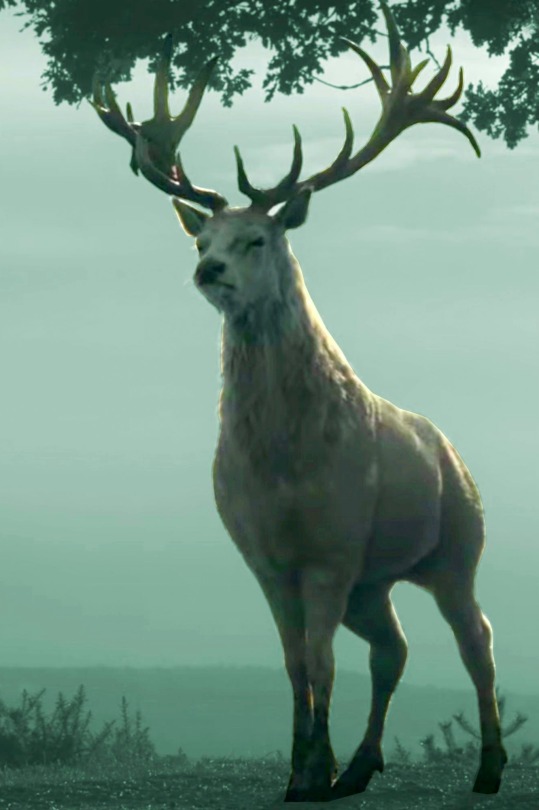
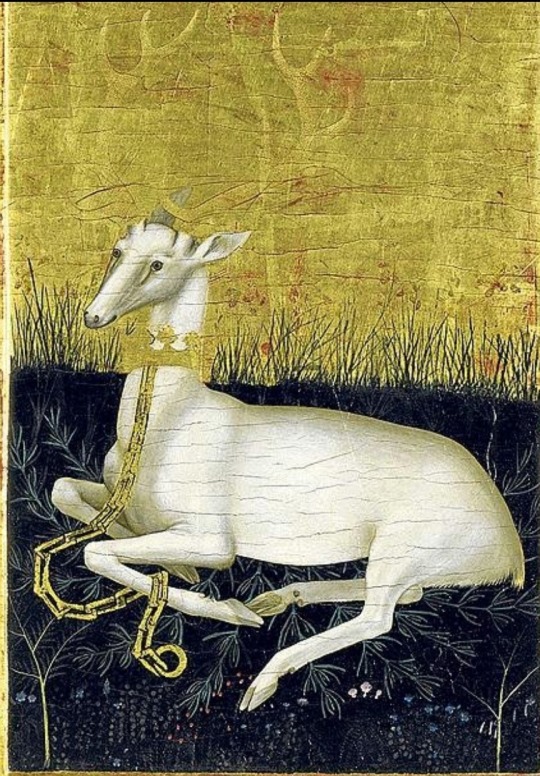
Let’s use my dusty knowledge of the Plantagenet era and talk about the white hart in HotD. I've had some really muddled thoughts and feelings about that scene and the way it framed Rhaenyra’s struggle for the throne to the general audience, but I also think there might be deeper meaning to it than what was initially obvious. If GRRM was as involved as he says, then at least some of this was likely deliberate; he's made no secret of taking inspiration from history, especially British history. The world of ASoIaF often rhymes with it.
The white hart wasn’t mentioned in Fire & Blood, and in my opinion its inclusion in the show seems to be not only foreshadowing Rhaenyra’s journey, but perhaps even commenting on the unreliability of F&B as a supposed “factual” account.
In our world the white hart is not just symbolic of royalty and burgeoning heroism, its much more specifically recognised as the heraldry of an English king; the deposed and disgraced Richard II. Though the only thing historians can agree on with Richard II is that he was considered physically beautiful by his contemporaries, modern historians at least somewhat unanimously write of him as a fair enough ruler, but for his belief in his own divine authority, as well as a lack of willingness or ability to play the political game, all of which facilitated his downfall. Simon Walker wrote of Richard II, "What he sought was, in contemporary terms, neither unjustified nor unattainable; it was the manner of his seeking that betrayed him." ...Sound familiar? Richard later died as the prisoner of his successor, the usurper Henry VI, a man whose expected inheritance Richard II had once subverted.
(There's also something to be said for the fact his rule and subsequent deposition has been argued as the groundwork for the War of the Roses; the real life inspiration for the events of A Song of Ice and Fire... maybe don't quote me on that to any historian though, it's heavily contested.)
So, Richard II was supposedly a good enough man and ruler by contemporary standards, but he is remembered overwhelmingly negatively, most likely because of one very specific depiction; Shakespeare's Richard II. An unflattering depiction, steeped in exaggeration and a somewhat understandable need for drama. It's now the most widely-known representation of him. So is it possible that, through the white hart scene, we're being told Richard II and Rhaenyra run parallel to each other in one more way? How accurate is Fire and Blood truly, when it comes to its depiction of Rhaenyra? Does it meditate on her faults and exagerate her cruelty? Almost certainly. Is it any more accurate than Shakespeare's Richard II? Perhaps not.
My local pub happens to be called ‘the white hart’ (not even a weird coincidence tbh, it's just a very common pub name), and it has a framed copy of Richard II's heraldry (the image above) on the wall. I’ve spent a fair amount of time looking at that thing wondering about the symbolism of the crown sitting around his neck and the golden chain that trails from it. The implication of a crown as the thing that holds captive this noble animal… What better way to describe the claimants of the dance? It's not only Rhaenyra, but Aegon too, who is the stag with the crown at their throat, golden chains dragging them down.
89 notes
·
View notes
Note
9 Supercorp
1 new message.
The notification reads. This is odd. Nobody ever sends Kara any messages on this account, for the sole reason that it doesn't have much followers.
It was Nia's idea initially. She's told Kara to buy herself a journal. She keeps one herself, where she writes all the dreams she doesn't know how to interpret yet.
"You should write down whatever it is and let it lie there for a while you know?"
Kara thought about it, had mulled it over and over in her head. A journal is indeed a great idea. An outlet of sorts. But the thing is, a journal is too private. If Kara wrote in a journal the only person who would ever read it would be herself.
Kara didn't want that. Kara hungered for an audience. She wanted to write and put it out there, out in the world where somebody will maybe one day read it and come to her--tell her, "Me, too. Me, too."
She wanted to write and be read by people.
And so, the journal idea became the Instagram poetry account idea.
A handful of original poetry posted in between aesthetic photos.
Nia and her sister are the only two people in her life who knows about it. That's why she is genuinely shocked when she reads the notification.
By the time, she's collected enough courage to open the app.
There have been more than 10 notifications. First, was the follow, next was a series of likes and then finally the message.
Kara clicked on the profile first.
It was a bookstagram account it turns out. There was only the username display, kieran. All in lowercase. No location, no bio, no nothing. The icon was of a single, black, loopy 'K' on white parchment.
The feed was of book covers, pages, spines and some quotes here and there.
The thing that Kara noticed about it though was how sad everything looked, once she's looked at it all in one grid.
It looks beautiful but melancholy.
She opens the message.
"I don't usually do this but...I just have to tell you that, your poetry has more of an impact than you will ever know. Thank you making me feel like I'm not alone. Thank you for sharing your words."
It was signed with a single heart and a 'k'.
And that's when it hits Kara.
Kara writes out a reply.
I'm out there.
I'm out there, in the world. And somebody is reading my words. They're reading what I wrote and it made them feel something.
"Thank you for taking the time to write those kind words to me. I hope you know you've made me want to write now more than ever. Thank you."
She added a heart at the end too. Kara didn't check her phone for the rest of the day.
They didn't reply it turns out. Kara tries not to feel too disappointed at that and tries to go on with her life.
Although, two weeks later after their first interaction, Kara posts two new poems, she discovers that kieran didn't stop reading.
Kara would usually get a like or a comment of a single heart then and again, and if she's lucky they'll comment a 'Beautiful.' underneath one of Kara's longer poems.
Kara collects all those crumbs and keeps it close to her heart.
******
"had a shity day ur peom made my night. thbk you."
Kara reads the message at 7 am, it was sent at 3:36 am. It isn't till she's halfway through, that her groggy mind realizes that they must've been drunk when they sent her this.
There's a twinge of worry in her chest, so she writes.
"I'm glad I made your night. And I don't want to overstep, but I think you were drunk when you sent this. I hope you're alright today. Drink lots of water! Thank you for the kind words."
She doesn't check her phone for the rest of the day.
Kara's knee-deep in Snapper's column assignment when her phone pings.
"Don't worry, you didn't overstep. I think you're the kindest person I've ever met."
Kara can't help the feeling of concern when she reads the message. Imagine thinking an Instagram poet who you've interacted with, two times in total, is the kindest person you've ever met. Never mind the fact that she's the Instagram poet.
Kara feels intrigued by this person.
Maybe it's because they're making her feel important. Maybe it's because Kara doesn't know who they are and the mystery appeals to her. Maybe it's because with them, Kara isn't anything. She's just a poet.
Maybe it's all of those or maybe it's none of those reasons at all.
Nevertheless, Kara sees her fingers fly across the keypad before she can even realize what she's doing.
"And you, IG user kieran, I think are the most interesting person I've ever met : )"
She puts her phone facedown on her desk.
Kara stands up from her station, walks around, pokes her head into Snapper's office, asks if he needs anything, gets yelled at, bothers Nia, walks around the entire bullpen, refills her tumbler, sits back down on her desk.
1 new message.
Kara lunges for her phone.
"Interesting huh?"
Just that. Just that and nothing else, yet it makes Kara feel like she's being observed, judged, weighed.
"Your feed is beautiful, your books. What I wouldn't give to get a peek in that beautiful mind of yours."
Kara exits the app, her thumb gliding through the screen so fast, it's a miracle it didn't break under the pressure.
She stands up from her desk and does a whole 'nother round.
1 new message
Kara takes a deep breath before opening the message. She doesn't even know why she's nervous.
"my mind is a lot of things, but i doubt beautiful is one of them."
What does she mean by that? Well, Kara guesses, everyone's brain is a mess right? She's pretty certain she's fucked up herself in more ways than she even knows.
So that's what she says.
"Everybody's a mess i think. Doesn't mean they're not beautiful."
Kara waits and waits and waits.
The reply doesn't come.
*******
Life goes on, her IG account gains more followers, her poems get stacked upon each other each week.
She always notices which ones kieran likes though.
They never message each other again.
******
And then, that one fateful day comes—Kara falls in love.
She meets Lena and Kara falls.
Hard.
Lena catches her and together they write what Kara thinks, is the most beautiful love story in existence.
Lena's her soul mate, her best friend, her one true love.
Her poems become lighter, happier.
She's so caught up with living in the real world with Lena, that sometimes she doesn't even have the time to write poems anymore.
Why would she? When she's living a brand new love poem each day she wakes up to Lena by her side.
One night, Kara is putting on her pajamas, and Lena is taking a picture of some book in their bed, her hair in a bun, big nerdy glasses perched on her nose.
Kara is in the middle of climbing into bed when Lena asks her, "Hey, have you ever read poetry and felt like it was speaking to you directly. As if the poet wrote it with you in mind??"
Quietly, Kara answers, "Yeah."
Immediately, Kara's head travels through all the snippets of conversations she's had with kieran.
All her IG posts, the one account, the one thing that Lena does not know about.
"Why?" Kara follows-up.
Lena's sat, leaning into the pillows, her phone in her hand.
"There's this- you know what? Why don't I just show you? You'll get what I mean, when you read it."
Lena shows Kara her phone screen and Kara freezes.
There on the screen, is her Instagram poetry account. @kz_elwrites.
Her entire collection of verse all lit up in Lena's phone.
"I-" Kara doesn't know what to say. And Lena notices, of course, she would.
Lena always notices. ,
"Kara?" She asks. "Is there something wrong?"
"I wrote that." Kara lets the words hang in between them.
She meets Lena's eyes, reads the shock there.
Kara grabs her phone from the nightstand and opens her IG app--shows it wordlessly to Lena.
Lena takes the phone gently from her hands, flicks up and down for a couple of minutes.
Kara feels like something important is going to happen. Everything feels to quiet. Lena is too quiet.
Lena hands Kara her phone back, still not speaking.
And then, Lena turns back to her phone, swipes a couple of times.
"Come here," Lena whispers. "Take a look."
Kara's eyes land on the screen.
kieran.
"You're-"
"I am."
prompt list here
#i really liked writing this one#i like the fact that they didnt know they were already falling in love with each other even though they havent met#it's like it was deeper because they fell in love with each other's thoughts first#anyway i do have an ig account just for poetry so yep#there's still a lot of prompts and im trying to finish em but im gonna pass out soon#so im gonna write em tomorrow#if u see a typo no u didnt#the reckless writer writes#prompt fills#supercorp#supercorp fic rec#rcklss writes
1K notes
·
View notes
Note
If you don't mind me asking, could you tell me about DIO and how he became your favourite? I'm curious!
you know what that's a really good question and i wish i had a clear answer but it kinda just happened lmfao. there was some process to it that i can easily narrow down though and i will gladly dive into it and try to explain it because you KNOW i'll take any chance to talk about god damned DIO lmao
im gonna try to make this as coherent as possible but please bear with me, i'm pulling an allnighter and am currently in the 24th hour of awakedness so lmao
ok first; initially kakyoin was actually my favourite for a while, and after a while i'd say i like them the same, but we all knew. we all knew i was a dirty little liar. i have 4 kakyoin figures. i have a DIO shrine. i wrote several analyses of DIO. my god damned phone background is DIO. idk who i was trying to fool lmao
the funny thing is that before i watched jojo i actually fucking hated DIO lmfao, there was a blog here that posted undertale quotes and i really enjoyed it, but then one day the blog decided to just start posting 'you expected x but it was me, dio' memes and it was extremely unfunny and annoying and i hated it and i hated him lmfao
then i watched jojo with my friend and i just thought DIO was funny in like a fucked up way, mind you i watched the dub which made him extra funny with the british accent
i "liked" him but more like as a joke. i did really enjoy just the sheer extent of how vile he was though, making a mom eat her own baby is still one of my favourite fucked up things i've ever seen a villain do. it's the way he had fun with being absolutely reprehensible that made him so much fun to watch. i love when villains are fun.
having seen him in parts 1 and 3 i still kinda liked him as a meme and eventually as like, "i hate that i like him lol"
but like, then i've seen the OVA, and DIO spoke with andrew chaikin's voice in the dub and i was just kinda uh 😳
because like andew chaikin's freaking DIO voice???? hi hello??
also just in general how DIO is in the ova... his design and animation are fucking stellar and he was just a freaking delight to watch, but his voice made him particularly comforting to me.
so yeah it was the ova. the ova is to blame for all of this.
i do feel a need to mention because this is something that would make me super uncomfortable if people misunderstood it, but as i am aro/ace, my love for DIO is not of a romantic or sexual nature at all. i'd describe it more as like.. adoration? i see him as a muse and a comfort character.
the reason i actually really started liking DIO so much and why i consider him a comfort character is because he turned out to be just.. amazingly, delightfully comfortable to draw. i enjoy drawing him so much. i've drawn him 128 times and plan to draw him many more times. i think my art has improved immensely just from how much i've drawn him, especially when it comes to more muscular bodies, which i really didn't enjoy drawing before.
he's so incredibly fun to draw because he combines this macho huge body with fashion and elegance and beauty, and drama and evil and danger and egypt and vampires. there's always something about him that's gonna inspire me to draw another piece of him. i haven't had an art block since i started drawing him (though worth noting is that my mascot Luv has also been a top notch fighter against art block; him and DIO are my main muses to always keep me drawing and experimenting and creating new approaches)
I also think DIO is a hugely interesting character, as it's apparent by how much i've written about him in the past. i think his motivation is so messed up and convoluted and interesting because yeah a fucked up vampire who's been isolated underwater for 100 years would probably not exactly be a stable and rational person lmao
to me as someone with social anxiety, the fact that his main goal is to achieve peace of mind is also really interesting. uh, spoiler for stone ocean here so im gonna cross it through so people won't accidentally catch a glimpse of it but, ok firstly i think DIO's plan was absolutely batshit and definitely not the right thing to do LMAO, but i love that he literally wants to change reality to know what's gonna happen next, because not knowing things in advance is preventing him from achieving his peace. like im not saying i relate to DIO because i really don't, but as someone who's been very familiar with anxiety, it's really interesting to see that as a villain's motivation (also might as well mention i don't think DIO has anxiety, i think it's more like frustration over lack of control with him, also he's a huge paranoic)
i want to also talk about his philosophy that i genuinely love so much, and that is the concept of gravity as he means it on that famous panel. DIO's idea of gravity is a very zen concept, it's the idea that fate will bring you where you need to be, fate will make you meet the people you need to meet, etc. as someone who struggles with anxiety, that is a really compelling idea to me, which helped me overcome stressful situations long before i got into jojo. of course i do understand that to some people the idea of a predetermined fate can be terrifying and tbh i totally get it, but for me, when it comes to anxiety-inducing situations, the idea of "gravity" has helped me be less stressed. it's a very interesting concept and i love that it's something that's so deeply ingrained in DIO's philosophy. (PS just so you know whenever i say DIO's plan was a good idea i am joking 100% of the time, i would not want to live in the world he wanted to create. however, it's funny to say DIO was thinking of us socially anxious folks so im gonna keep saying it lmao)
you know, it's also really funny that like.. DIO ended up being such a massive beloved comfort character of mine, because like up until him, i generally got attached to characters who were very Good and Wholesome lmao. tfw the two characters that served as the most important comfort characters for me in my life were DIO and......... Papyrus from Undertale LMAO
they are almost polar opposites, but what they both have in common is that they are both very confident, and i'd say that while characters who doubt themselves are generally those i personally relate to, characters who are confident are the ones i gravitate towards for "support". Papyrus has been a character who i honestly hold single-handedly responsible for helping me turn my life around and just.. had an amazing impact on my mental health. i dont want to know who i'd be today if i never got into undertale.
with DIO, i feel like part of the reason why im so joyous and loud about how much i love him and why im so open about how much fun im having enjoying his character so much is because if i were to meet this character back then, when i was in college or in high school, i would never allow myself to enjoy this. i think that to me, DIO being such a huge comfort character represents like... something? i can't quite put my finger on it, but i feel a certain kind of pride and freedom about it because i know i overcame something in these past few years, and that i am much better and happier for it in every aspect.
i am very much a person who gets deeply attached to things or characters that i associate with positive changes in my life. because i've been at such a low point once in my life, i cling to things that remind me of how far i've come.
im just like.. really happy to be here as i am and DIO somehow became a deeply ingrained part of that.
#or at least he will become a deeply ingrained part of it once i get that tattoo i scheduled to get in june next year lmao#jamble ramble#dio brando#about me
43 notes
·
View notes
Text
#i initially wrote down this quote because of how beautiful it is#at the time it only seemed like an observation of how much humanity has changed over time#but now i can't help but think about what he does later on...#saying he is a defeatist or escapist doesn't feel like it captures his motivations#he realised they changed and knows they will have to change even more#his motivation is not simply catastrophising or fleeing but rather *developing*#if that makes sense?#to him going into space was the only logical next step for humanity to survive#making this quote as much an observation as it is a prediction#which is beautifully done#also thinking about his thought later on of how instead of finding a habitable planet they might be travelling in space forever#but that this generation wasn't ready yet to consider that#of course his ship had to be called Natural Selection lol not very subtle there#also:#the phrasing 'we' against 'you' makes me think that he knew he wouldn't be a part of this in the end#for someone who thinks things through as much as he does#some part of him must have realised there would be no place for him in this new version of humanity
“We belong to the Earth and the sea, you belong to the stars.”
— Zhang Beihai (The Dark Forest - Cixin Liu)
#sorry for the tag copy but these are very good keep cooking#i feel like a lot of his actions are like . whatever it takes i will shape historys course with my own hands#三体
30 notes
·
View notes
Text
Some Thoughts on “Dead to Rights” by Radio Company
First, if you are not a Cockles truther, you should probably look away. My tinhat is so tight it hurts. Surgical removal has been deemed too risky and would probably result in my demise.
The comments here are entirely mine, as are the assumptions incorporated into my lyrics analysis about real-life people and their relationships. No disrespect is intended. Please do not contact Jensen, Misha, or Danneel about anything you read below, or about anything Cockles-related, because there is absolutely no evidence for anything I am saying here, and their lives are essentially unknown to us.
Thank you.
_______________________________________________________________
She said It all will change If not it all can wait It may die away Over time But I do believe It's better than being alive It's better than being alive It's better than being-
Bombs away Only just begun You want to be the one to say you love The rain-
fall
When all the while the angels call; The only way to see just how it comes to be Every day To know it all falls away.
You had me dead to rights Holding down my chain; You had me dead to rights I got out again; Never been the same.
Song composed by Jensen Ackles and Steve Carlson
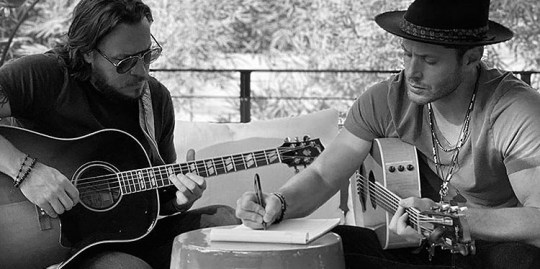
No official statement has ever been made by the two songwriters as to who wrote the lyrics, who wrote the music, or if words and/or music were composed by both. I am proceeding on the assumption that Jensen wrote the lyrics. He has mentioned writing lyric ideas on notepads (as shown in the above photo), and so indeed he gives much thought to his lyric-writing process.
In another track from Vol. 2, “City Grown Willow,” a song clearly written by himself, he uses “chain” imagery. Clearly, the concept of the chain resonates for him, whether the chain belongs to his lover, in “City Grown Willow,” or, as in this song, the chain is attached to himself, with the other end being held by the “she” he refers to throughout this lyric.
In addition, a close examination of other tracks by Radio Company share similar lyrical hallmarks as “Dead to Rights”: the invocation of a “she” in “City Grown Willow,” who I maintain is the same “she” as the one here, namely Danneel; “bombs away,” a metaphor for his emotional relationship with the “bomb,” i.e., Misha, recalls “cannonball, rise and fall,” from Vol. 1; other similar MC metaphors are the “fire” from “Jump into the Fire,” and “he stokes the flames ‘cause he is amused by the glow,” from “City Grown Willow.” Other JA lyrical hallmarks can be identified here as well.
________________________________________________________________
“’Dead to rights’ means having overwhelming evidence of someone's guilt, having irrefutable proof that someone is responsible for something. The idiom ‘dead to rights’ came into use before the 1850s in the United States.”
“’Dead to rights’: In the act of committing an error or crime, red-handed. For example, ‘They caught the burglars dead to rights with the Oriental rugs.’ This phrase uses ‘to rights’ in the sense of ‘at once.’”
________________________________________________________________
The theme of guilt is embedded in these lyrics--the narrator, JA, is guilty of something, and he was “caught red-handed,” as it were, by someone, the “she” in the song--his wife. The “guilty” act was more, I believe, her intuiting/noticing that her husband was in love with another--early days, perhaps before much had occurred between the two men, but wives are smart, and they can sometimes intuit when their men are in love with another, even before the husbands know themselves.
“She said”---This song focuses on the fact that the narrator’s wife notices instantly--”at once”-- the “act” for which he feels guilty. And she voices it to him--she knows he is in love with another. And she also knows who.
Thus, the “dead to rights” reference--she knew right away when her husband fell in love, and that he either wants to, or already has begun, pursuing a romantic relationship with his love. She “caught him red-handed,” even though a “crime” has not literally occurred, and, most importantly, *she is not angry or judgmental*; rather, she is concerned.
She has thought about it before she confronts him with it. She is philosophical: “It all will change”--that is, this could be a momentary fancy, and if you follow through, everything will change in your life. “if not”--that is, if this is something lasting and substantial--then “it all can wait.” What’s the rush? Why not cool your jets and see if you still feel the same way in a few months? And know too, if you do pursue this, “It may die away over time.” So be careful. Don’t jump into the fire. You could get burned. I don’t want that for you.”
What is his response to her words? He acknowledges to her: “You are right.”
He concedes that everything she says is true. But he has thought about it too. A lot. And he realizes something: “But I do believe it’s better than being alive.” This cryptic line puzzled me initially. “What” is better than being alive? Then one day, after hearing the track a few times, it hit: If the relationship crashes and burns--if it does die, and his heart is destroyed in the flames and ash--then so be it. He has decided that being with this person, jumping into the abyss with him, which could result in his own metaphorical “death,” is exactly what he will do, because “dying” from the possible fallout of a disastrous love affair is preferable to the agony of continuing to live without him.
“You want to be the one to say you love the rain.....fall” --I love the pause here, putting the emphasis on the “fall,” conjuring up the act of falling in love; and also, the possibility of falling to one’s death. And of course, the biblical “fall”--we’re all fallen from grace. He is reminding her that it is she who always says she loves the rain--metaphorically, the rainy days, the times when things aren’t necessarily all sunshine and roses. She understands and accepts life’s gifts and risks. (And we learn in “City Grown Willow” that, in fact, “Her faith in love is better on sunny days.”)
“When all the while the angels call”--I cannot emphasize enough how unequivocally this imagery refers to MC. If I have to explain how many times J has called M an “angel”.....The point being, the angel calling him is impossible for him to ignore, and he just plain doesn’t want to. When an angel calls your name................you go.
“The only way to see just how it comes to be”--a typical Jensen cryptic line, when he wants to say something but doesn’t want to be too revealing, so he does so with the utmost vagueness, to the point where his meaning is almost impossible to decipher. That cryptic line, combined with the rest of the verse, “Every day/To know it all falls away,” strikes me like this: “The only way to know if I should do it or not, is just to do it.” And in the end, he philosophizes, everything falls away in any case--”even you and I will someday be parted.” The idea of mortality--of the limited span of time we inhabit this life--is heavy on his mind. And again, he has made his decision: His love is so deep, so compelling, that he is willing to risk everything--heart and soul--to be with the angel who is calling him.
_______________________________________________________________
ADDENDUM TO MY POST:
Unless Steve Carlson has said publicly that he specifically wrote the *words* to City Grown Willow, I maintain steadfastly that Jensen composed the lyrics. It makes sense that Carlson had written the guitar piece itself, with its beautiful, cascading notes and striking chord progressions, which demonstrate his skill as an instrumentalist. It’s no accident that the recording itself features only Carlson’s playing, with no other instrumental accompaniment--probably exactly the way Jensen first heard it.
Jensen heard Steve play the piece, loved it, and proceeded to write words for it. When Carlson says he played this piece for Jensen and that he had written it years prior, I take that to mean that Jensen loved the sound of the guitar and wanted to work with it.--that the song had no words. The lyrics have the hallmarks of Jensen's writing style; the content fits his situation, with a female and 2 males as the protagonists; and HE is “the man from the mountains.” That’s not Carlson’s identity--that's a moniker Jensen deliberately chose for himself, as he makes clear in the music video.
If anyone can provide for me a direct quote from Carlson that he wrote the words, I will retract my statement. Until then, I hold my position.
#Cockles#Radio Company song#lyrics analysis is a love of mine#no offense is intended and I know nothing about anything#even cryptic lyrics can be deciphered#some people have tremendous grace and I love them#I will never as long as I live measure up to the greatness in these people's hearts
107 notes
·
View notes
Text
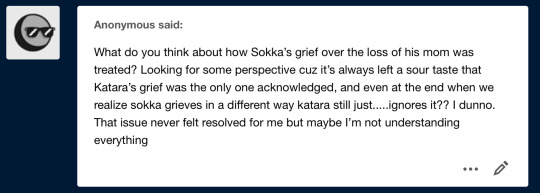
Lord, this answer got long. I’m a little embarrassed about it, but I wrote it, so it’s getting posted. It’s a literal essay. Sorry but also not?
TLDR: Yes, the show is arguably unfair to Sokka about Kya, but it also follows a pattern where Sokka stays quiet about Bad Feelings and plays by the rules established for his character. Katara, meanwhile, grieves loudly and often, and appears to be under the impression that because Sokka’s grief is silent it doesn’t exist, which also fits her character/interactions completely. Neither of them are right or wrong, but it sets them up on inevitable collisions.
Now. If you want to join me on a cactus-juice fueled descent into madness, proceed below the cut.
Number one. We’re referring to this exchange in “The Southern Raiders,” where the Gaang is talking about Zuko and Katara going after the man who killed Kya, which is vicious and brutal and never reflected on:
Aang: You sound like Jet. Katara: It's not the same! Jet attacked the innocent. This man, he's a monster. Sokka: Katara, she was my mother, too, but I think Aang might be right. Katara (angry, yelling): Then you didn't love her the way I did! Sokka (visibly hurt, softly): Katara.
And that’s it. Upon returning, Katara apologizes to Aang and not, as Anon is absolutely correct in pointing out, to Sokka, who is 100% the more injured party. Now. Is it possible this is one of the rare missteps from the atla writers? Yes. Absolutely. Is that the answer I’m about to write a literal fucking essay about? No. Because it’s more painful fun to take it as face value and talk subtext.
First, a reminder that this show is fucking good at what it does. It teaches you how each character grieves as we go: Aang explodes, often triggering the Avatar state, usually crying or angry, and when he does try to repress his Bad Feelings it rarely lasts longer than a day; Toph either shuts down or gets mad, but either way she doesn’t like people seeing her having Bad Feelings and often storms away, knowing that she can’t control it no matter how much she might want to; Zuko yells at the sky in a rainstorm or yells at his dad in an underground tunnel or challenges Zhao to an Agni Kai or yells at his uncle in a jail cell and generally is an emotive nuclear bomb because the boy has feelings and if he keeps them inside for more than three seconds he might explode okay.
Then we have Katara and Sokka.
Let’s start with Katara, since she has the most textual and straightforward displays of grief. She’s really the only one to talk about Kya’s death in Book 1. If Sokka mentions it, it’s barely in passing. I don’t think we hear Hakoda address her death at all (which I’ll return to in a moment.) Katara’s grief is loud. It’s angry. It’s still very much a living thing for her. She thinks she sees Kya in the swamp and breaks down crying, and tells Aang and Sokka about it with no hesitation. When she’s angry and sad at Hakoda for leaving, she acts out and is visibly upset with him, yells at him, cries at him. She out-loud hates Zuko when she comes to the conclusion that he told her about Ursa and got her to talk about Kya to manipulate her. It isn’t that her grief is performative, because it’s a very real and terrible thing, but it’s a grief that’s to be witnessed.
Then, Sokka. Sokka’s grief is more complicated because it exists almost entirely in subtext, especially in regard to Kya. We really only hear him talk about Kya twice, both in Book 3. First, to Toph, when he tells her that he can’t remember what Kya looks like. Worth noting, however, that even though it is Sokka talking, this is still centered on Katara and Katara’s grief. The next time is when Zuko asks what happened to Kya, and Sokka tells the story that leads into the initial flashback. Sokka doesn’t talk about his mom. This is a fact of the show. It’s such a fact of the show that, in “Southern Raiders,” after the exchange at the start of this post, while Katara and Zuko are on the hunt, Sokka doesn’t bring up Kya again and is messing around with Aang. Like nothing has happened or is currently happening--which I’ll come back to in a moment.
So while we can use Kya as a perfect example of how Katara grieves, we can’t really use her for Sokka. So let’s use Yue instead. Moments we see (or don’t see) Sokka grieving Yue:
In the opening to Book 2, we briefly have a shot of Sokka with the moon imposed behind him.
“The Swamp,” where Sokka’s vision is of Yue accusing him of not protecting her. This one is one of the more textual moments of grief--”I think about Yue all the time”--but what’s awful great about it is how Sokka tells Aang and Katara. Aang, obviously, has no qualms about sharing his vision. Katara openly talks about seeing Kya. Sokka only tells them about Yue when explicitly asked. Even then, he doesn’t mention what she said to him. From this, we can assume that Sokka is still holding onto a lot of guilt over her death--guilt that he won’t let Aang and Katara see. Anyway. Moving on.
“The Serpent’s Pass.” After spending all day panic protecting Suki, he tells her that he lost someone, but doesn’t go much further into detail, just saying that he can’t when she tries to kiss him. Of course, this is all happening in front of the moon. Again, though, Sokka stays vague. He doesn’t tell her any details.
“The Puppetmaster,” Toph posits that maybe the moon spirit has gone mean and is kidnapping people. Sokka snaps at her, in a moment definitely meant for laughs, saying, “The Moon Spirit is a gentle, loving lady. She rules the sky with compassion and ... lunar goodness!” It is a funny moment, but here’s what we can take from it: Toph doesn’t know about Yue. Toph is a Feral Bastard a lot of the time, but she also knows where the line is, and I don’t think she’d’ve said that if she’d known.
“Boiling Rock,” in arguably the most quoted (and well deservedly so!) line in the entire show. “My first girlfriend turned into the moon.” “...that’s rough, buddy.” COMEDIC GOLD. Also, weirdly, the literal only time that Sokka explicitly tells someone about Yue in the course of the show.
“Ember Island Players” which I haven’t hit in my rewatch yet, but I definitely remember a moment where Suki asks Sokka when he was gonna tell her he made out with the moon, and he tearfully shushes her. Again, played for laughs, but the implication is that he still hasn’t told Suki about what happened.
This plays perfectly into the same way that Sokka (doesn’t) talks about his mom. When the Bad Feelings come, Sokka either avoids them and finds a distraction (Goofs with Aang--see, told ya we’d come back to that) or stays silent. When someone explicitly asks him about the Bad Feelings--what he saw in the swamp, what’s eating at him in “Sokka’s Master,” why he’s panic-protecting Suki--he’ll answer, but often talks around the actual issue. (Interestingly, it’s in regard to Suki we see the most explicit manifestation of Sokka grieving as Azula taunts him during the invasion: he cries, he attacks Azula, he yells and questions her despite the fact he knows she’s wasting their time. I think this one hits him because, as this beautiful post points out, Suki’s the protector in the relationship, and Sokka can actually chill out for 2 seconds. But he let his guard down, and Azula got Suki. Anyway. That’s probably a different essay: back to the matter at hand.) We even see this in “Boiling Rock.” There’s a moment where they think Hakoda is not with the other political prisoners. Sokka’s tense, drawn tight, but the only thing he says is, “No.”
Basically, we’ve got Katara, who grieves loudly and rages and is kinda like white-water rapids that churn and churn and churn. And we’ve got Sokka, who, to quote John Mulaney, looks at his grief and says, “I’ll just keep all my emotions right here and then one day I’ll die.” Iceberg grief, to keep the water metaphor going.
And where did these come from? Yup! Water Tribe gender roles! What we know from the show is that, while the South is typically more progressive (women can train as benders and marry who they want, at least) than the North, it’s still very rigid: the men are warriors/hunters/protectors, the women stay home to cook/clean/child-rear.
Now: subtext! And why I think they are this way!
We’ll start with Katara. The last waterbender in the South Pole. She no doubt grew up doted on. If I say she’s most likely a little spoiled, I don’t mean it in a bad way--I mean it in a she’s the last living remnant of this aspect of their culture kind of way. When raiders come, she’s probably the first priority to protect. Kya dies to keep her safe. Her needs are generally put before the community as a whole. (This isn’t to say that Katara doesn’t contribute or care about her community, because she 100% does). But! Especially in Book 1, we see Katara often considering her opinions as facts (trusting Jet, the waterbending scroll) and doesn’t always pause to consider the larger impact that her actions will have (scroll and Jet again, challenging Pakku, dressing up as the Painted Lady despite the fact the factory will hold the village responsible). And many of these actions are good! But we see a lot of Katara being pretty self-centered--what can I do, how does this impact me, how do I feel about this? And this isn’t a bad thing! This aspect of her character makes her complicated and complex! Katara loves her family and protecting people and caring for them! She’s extremely empathetic! But she also struggles to meet people where they’re at when they emote in a different way than she does (see: her clashes with Toph, her initial problems with Zuko joining the group, the above interaction with Sokka). It’s also worth talking about how Katara witnessed her mother’s death, which no doubt makes her grief about it a sharper thing.
Then, again, Sokka. Also loved in his community! But a normal kind of love, I’d assume. He probably was raised on stories of the Fire Nation dragging waterbenders away. No one exemplifies the Water Tribe ride-or-die mentality quite as well as Sokka, or the gender roles of the man as the warrior/protector, so you gotta believe Hakoda raised that kid to look after his sister at all costs, which we see throughout the show (already preparing to go after Aang in the South Pole because he know Katara’s going anyway, “You burned my sister!”) And he isn’t there when his mom dies. He finds out later. He goes from feeling like a victor who helped chased the raiders away to the worst realization of his life. I have to imagine he’s ashamed by the fact that he thought everything was going to be okay, which leads into his worldview of assuming that nothing is okay ever in any circumstance.
Finally, Hakoda. Who never, unless I’ve forgotten something, talks about Kya. All we know is that their family fell apart after her death (per Sokka in “The Runaway,” learning how Katara stepped up to hold everything together) and sometime after he took the warriors and straight up left. He apologizes for leaving but doesn’t address the fact that he left Katara and Sokka with no parents at all, only the war. This is, uh, not exactly echoing a healthy coping mechanism?
My theory: Kya dies. Since the Water Tribe is so embedded in gender roles, Hakoda probably shut down and/or checked out emotionally for a while. This leaves his kids on their own to deal with their shit, and we learn Katara does everything she can to keep her family going. As the most protected individual in the South, Katara’s probably been taught that emotions equal attention, and uses her temper/caring/sadness to help bring her community closer. Meanwhile, Sokka, who hero worships his dad, watches Hakoda go stoic and learns that “real men” shove their shit down. Additionally, Katara’s grief is deafeningly loud, and Sokka’s number 1 role is to keep Katara safe. He’s taught that the Bad Feelings only get in the way and make things worse, and so he learns to be fine no matter what kind of terrible is going down around him. Basically, Katara learns to use grief as a needle and thread, and Sokka learns to bury it as deep as he can and avoid it at all costs. Opposite reactions to the same trauma. Katara gets mad and demands to be heard and listened to and seen, and Sokka gets sarcastic and prepares himself for the day the Fire Nation ships come back for his sister.
So. Back to those above lines from “Southern Raiders.”
From a writing standpoint, I do wish the final moment was between Katara and Sokka versus Katara and Aang. They could’ve had an almost identical interaction, but it would’ve been more nuanced. I don’t think that Katara needed to apologize, but I think we needed some acknowledgement from both of them: Katara continuing the lesson she’s learned about how her pain doesn’t entitle her to hurt other people (including Sokka, who is there no matter what she says or does), and Sokka that Katara’s process of grieving had to involve this catharsis.
Or. Maybe not. Because again--subtext. Their grief works in such different ways that I have to imagine this isn’t a new fight. It was probably brutal and vicious for a very long time. Maybe that’s part of what made Sokka try and go with the warriors. Maybe that’s part of why Katara gets mad so quickly in the first episode of the show. But eventually, unable to find an answer, they just...stop talking about it. Because the two of them don’t talk about it. Katara only talks about her mom with people who aren’t Sokka, and Sokka does exclusively to Toph and Zuko.
The only time I can think of Katara and Sokka talking about it together is the exchange at the top of this post, and it gets ugly fast, and it isn’t brought up again. It’s a fight that will never be resolved, because they fundamentally can’t react to one another in a way that can be universally understood.
“You didn’t love her the way I did!” Katara yells, loudly, because if Sokka loved her then why isn’t he raging? Why isn’t he getting his sword and coming to help her? Why doesn’t Sokka want to burn this firebender to the ground and make him see and hear and look at what he’s done to the world? To their family? He must not understand. He must not care as much or he’d be screaming with her.
“Katara,” Sokka says, much quieter, and adds nothing else. Not because there isn’t anything else to say, but because Sokka can’t talk about this kind of thing. Not doesn’t want to, but can’t, because it’s his job to protect people, protect Katara, and if he lets all those old hurts come boiling up he can’t do that, because that ends with losing focus and losing control and people getting hurt or going away. Why can’t she understand that?
And then they do what they always do. They don’t bring it up again.
#LITERAL ESSAY BY TUMBLR USER BONESBUCKLEUP#Sokka#Katara#atla#this is what isolation has done to me#this is the nerdiest bullshit that I've spewed in a while#felt good though#writing's been hard recently#I'm working myself back into it through atla shitposts and meta#long post#If I could harness this energy into something other than fandom I might rule a small country by now?#oh well
3K notes
·
View notes
Text
Daniel LaRusso: A Queer Feminine Fairytale Analysis Part 1 of 3
Disclaimers and trigger warnings:
1. These fairytales are European, although there’s often overlap in themes globally. I know European fairytales better, which is essentially the reason I’m not going to branch out too far. I opted to also stick to Western movies so as not to narrow things down, but also in particular “waves hand towards all of Ghibli” amongst many others. There’s a reason the guys in Ghibli are so gender.
2. TW for discussions of rape culture and rape fantasies
EDIT: FUCK I’M A GOBLIN CHILD! FORGOT TO PUT A MASSIVE MASSIVE THANK YOU TO @mimsyaf WHO HAS BEEN THE NICEST, KINDEST EDITOR ON THESE THOUGHTS AND CONTRIBUTED SO MUCH TO THEM AND GENERALLY IS A WONDERFUL PERSON!
Part 2
Part 3
1. Introduction
I recently wrote a little thing, which was about Daniel as a fairytale protagonist – specifically one that goes through some of the kinds of transformations that are often associated with female protagonists of fairytales.
I used quotes from Red Riding Hood, Labyrinth, Buffy The Vampire Slayer, and Dracula, which, as an aside – the overlap between fairytales, horror, and fantasy and the ways each of those genres delve into very deep, basic questions of humanity and the world is something that will always make me feral. I will be generally sticking with fairytales though. Also I am very excited about some of those Labyrinth concepts going around!
I’m going to use “feminine” and “masculine” in both gendered (as in relating specifically to people) and non-gendered (as in relating to codes) ways throughout this, depending on context.
To be binary for a moment, because sample-sizes of other genders are low, women are usually able to fall into either feminine or masculine arcs, although sometimes the masculine-coded woman can become a “not like the other girls” stereotype and the feminine-coded woman a shallow cliché – in both cases they’re also under more scrutiny and judgement, so it’s always worth asking “is this character not working for me because of the writing or because I have ingrained biases? (Both?)”
Men don’t often get feminine-coded arcs. Because. Probably a mix of biases and bigotry. But there are some that seem to have slipped beneath the shuttered fence of “Sufficient Narrative Testosterone,” and Daniel LaRusso is one of them.
2. Some Dude Comparisons (Men Doing Manly Action-Hero Things like being trans symbolism and loving your girlfriend… seriously those things are hella manly, I wish we saw more of that onscreen…)
a. Neo
Much like Neo The Matrix, whose journey is filled with transgender subtext and specifically and repeatedly references Alice In Wonderland, Daniel doesn’t go through quite the kind of hero's journey usually associated with Yer Standard Male Hero, especially the type found in the 80s/90s.
Neo is my favourite comparison, because of the purposefulness of his journey as a trans narrative and the use of Alice. But I’m sure there are other non-traditional male heroes out there (but are they trans tho? Please tell me, I want trans action heroes).
Neo “passes” as a socially acceptable man, but online goes by a different name - the name he prefers to be known by - feels like there’s something inherently wrong about the world around him and his body’s place in that society, and then gets taken down the rabbit hole (with his consent, although without really “knowing” what he’s consenting to) to discover that it’s the world that’s wrong - not him. And by accessing this truth he can literally make his body do and become whatever he wants it to.
Yay. (The message of the Matrix is actually that trans people can fly).
Neo is – kind of like Daniel – a strange character for Very Cis Straight Guys to imprint on. He spends most of the first movie unsure about what’s going on, out of his depth, and often getting beaten up. He is compared to Alice several times and at the end he dies. He loses. He has to be woken up with true love’s kiss, in a fun little Sleeping Beauty/Snow White twist. Yes, after that he can fly, but before that he’s getting dead-named and hate-crimed by The Most Obvious Stand-In For Normativity, Agent Smith, and being carried by people far more physically capable than he is (people who also fall outside of normative existence).
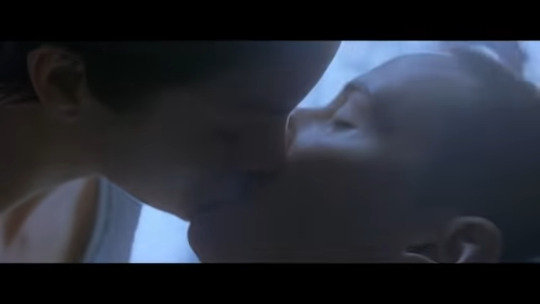
Trinity and Neo in The Matrix. The fact that a lot of the time neither of them is gendered is something. Literally brought to life by true love’s kiss.
I’m not about to argue that Daniel LaRusso is purposefully written along these same thought processes, so much as the luck of the way he was written, cast, directed, acted, and costumed all came together in the right way. And this is even more obvious when compared to That Other Underdog Fite Movie That Was By The Same Director as Karate Kid.
b. Rocky
The interesting thing about Rocky is that he is (despite being a male action icon) also not written as a Traditionally Masculine person. Large portions of Rocky – and subsequent Rocky films – are his fear and insecurity about fighting vs his inability to apply his skills to another piece of work and wanting to do right by his girlfriend (and future wife), Adrian. The fighting is most often pushed onto him against his will.
Much like in Karate Kid there is barely any fighting in Rocky I. Most of it is dedicated to how much Rocky loves Adrian and the two of them getting together. The fight is – again like in Karate Kid – a necessary violence, rather than a glorified one (within the plot, obviously watching any movie like this is also partly about the badassness of some element of the violence – whether stamina or the crane kick, it’s all about not backing down against a more powerful opponent).
Rocky is played by Sylvester Stallone. He’s tough, he’s already a fighter (albeit in the movie not a great one yet), he’s taking the fight for cash – so although he’s also soft-spoken and sweet, you’re aware of the fact that he’s got those traits that’d make a male audience go “Hell Yeah, A Man,” or whatever it is a male audience does watching movies like that… cis straight men imprinting on oiled muscle men sure is a strange phenomenon, why do you wanna watch a boxing match? So you can watch toned guys groaning and grappling with each other? Because you want to feel like A Man by allowing yourself to touch the skin of other men?
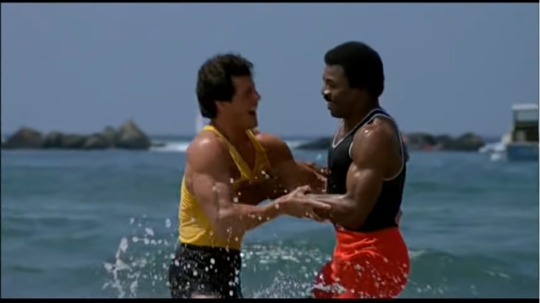
Apollo and Rocky in Rocky III. This sequence also includes prolonged shots of their crotches as they run. Sylvester Stallone directed this. This was intentional. Bros.
Daniel LaRusso is not built like that. But that doesn’t really have to matter. Being smallish and probably more likely to be described as “pretty” than handsome, and not having a toxic masculine bone in his body does not a feminine archetype make. It just makes a compelling (and pretty) underdog.
c. Daniel
So where does the main difference really lie? Between Rocky and Daniel? Well, Rocky has the plot in his hands – Daniel, largely, does not. Rocky is acting. Daniel is reacting or being pushed into situations by others. Just like our boy Neo. Just like Alice in Wonderland, Cinderella, Snow White – just like some of the women in some contemporary(ish) fairytale films like Buttercup (Princess Bride), Dorothy (Wizard of Oz), or Sarah (Labyrinth).
This isn’t a necessary negative about stories about girls and women, so much as looking at what it is girls and women in fairytales have/don’t have, what they want, and how they’re going to get it. It’s about power (lack of), sexuality (repressed, then liberated), men, and crossing some taboo lines. It’s also about queerness.
3. The Karate Kid Part One: Leaving Home
Daniel LaRusso is a poor, skinny, shortish kid (played by a skinny, shortish twenty-two-year old) who doesn’t fit in after having been taken away from the home he was familiar with against his will. Not every male protagonist in a fairytale leaves of his own will, and not every female protagonist leaves under duress – Red Riding Hood, for example, seems perfectly happy to enter the forest. However generally a hero is “striking out to make his fortune,” and generally a heroine is fleeing or making a bargain or being married off or waiting for help to arrive. She is often stuck (and even Red Riding Hood requires saving at some point).
Daniel then encounters a beautiful, lovely girl on the beach, puts on a red hoodie (red is significant), is beaten up by a large, attractive bully, loses what little clout he may have had with his new friends, and generally has a mostly miserable time until he befriends and is saved by Mr Miyagi. To do a little Cinderella comparison: Miyagi is the fairy godmother who pushes Daniel to go to the ball in disguise as well, and that disguise falls to pieces as he’s running away.
Then Daniel asks for help, Miyagi gets him enrolled in a Karate Tournament, and starts teaching him. Daniel wins the tournament and gets the girl, the end.
While Daniel has chutzpah and is a wonderful character, none of the big events are initiated by him, except for the initial going to the forest/beach (and within all of these events Daniel absolutely makes choices – I’m not saying he’s passive): Lucille takes them to California, Miyagi pushes him to go to the dance, Miyagi again decides to enroll him in the tournament and trains him, and only because Kreese doesn’t allow for any other option, Ali is the one who more often than not approaches Daniel, and even their first encounter is pushed by Daniel’s friends.
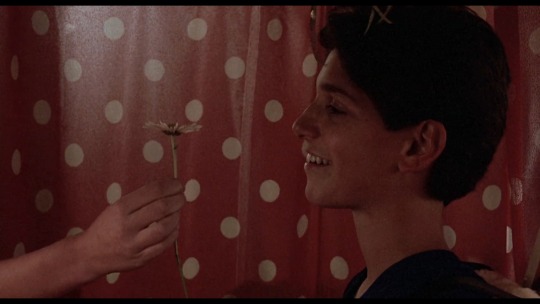
Daniel really is at a dance/ball in disguise and receives a flower from a girl who recognises him through said disguise, it’s unbearable! It’s adorable! I get it Ali, I fucking get it!
Daniel’s main journey within this – apart from not getting killed by karate thugs (love u Johnny <3) and kissing Ali – is to learn from Miyagi. He’s not necessarily a full-on feminine fairytale archetype at this point, although there are fun things to pull out of it, mainly in the context of later films and Cobra Kai: the subtext of karate and how that builds throughout all the stories, the red clothes, the themes of obsession, his being targeted by boys whose masculinity is more than a little bit toxic and based on shame… more on all that coming up.
He doesn’t technically get a home until they build him a room at Miyagi’s place, but he definitely leaves the woods at the end of this one, trophy lifted in the air after being handed to him by a tearful Johnny and all.
And then they made a sequel.
4. The Karate Kid Part Two: Not Out Of The Woods Yet
Daniel’s won the competition, Kreese chokes out Johnny for daring to lose and cry, more life-lessons are given (for man without forgiveness in heart…) and Daniel and Ali break-up off-screen, confirming that TKK1 was not really about the girl after all, which, despite Daniel and Kumiko having wonderful chemistry, is also an ongoing theme. Daniel enters the screen in The Most Baby-Blue Outfit seen since Tiana’s dress in Princess and the Frog? Or that dress in Enchanted? Maybe Cinderella’s (technically silver, but later depicted as blue)?
(Sidenote: At everyone who says Sam ought to wear a callback to that suit, you are correct and sexy).
Surprise, Miyagi’s building him a room.
Double-surprise, Miyagi needs to go to Okinawa.
Triple surprise, Daniel reveals he’s going with him, because he’s his son dammit.
The Karate Kid Part Two is maybe the least Daniel-LaRusso-Feminine-Fairytale-Protagonist of the three, because it’s not really his movie. Daniel runs around with Kumiko (aka the most beautiful girl I’ve ever seen), continues to be The Best Non-Toxic Boy a middle-aged Okinawan karate master could ask for, lands himself another Built Karate Rival (twice is just a coincidence, right? Right?), and eventually doesn’t die while wearing red again – twice: When Chozen almost strangles him to death at the Miyagi dojo and then during the final fight. The Saving Of The Girl (both the little girl in the storm and Kumiko) actually puts him in a more traditional masculine space than the previous movie did, even if the main theme of the film is about compassion and kindness and by the end, once more the boy whose masculinity is built on rockhard abs and matchsticks is on his knees. Daniel just has that power over big boys. It’s called kick/punch them in the face hard enough that they see stars.
There’s an aside to be made here about how much Daniel really is an observer in other peoples stories in this, although he is the factor that sends both Chozen and Kumiko into completely different directions in life (Chozen and Kumiko main characters when?) Anyway he comes out of it presumably okay, despite being almost killed. Maybe a few therapy sessions and he’ll get over it. Too bad Terry Silver is lurking around the corner…
5. The Karate Kid Part Three: The Big Bad Wolf
Alright people have written Words about the third movie. It’s fascinating. It’s odd. It’s eye-straining. It’s like olives – you’re either fully onboard the madness or it’s too off-putting for you (or you’re like. Eh, don’t see what all the fuss is about either way...). It’s basically a non-consensual secret BDSM relationship between a guy in his thirties (played by a Very Tall twenty-seven year old Thomas Ian Griffith) and a 17/18 year old (played by a shorter twenty-eight year old Ralph Macchio).
Also recently we got more information on Mr. Griffith’s input on the uh… vibes of the film. Apparently it wasn’t just The Sweetness of Ralph Macchio’s face, the screenplay (whatever that amounted to in the first place – release the script!), the soundtrack, the direction to not tone it down under any circumstances, the fact that Macchio categorically refused to play a romance between himself and an actress who was sixteen, no: it was also TIG coming up with fun ways to torture Daniel’s character and suggesting these to the director. Clearly everyone has fun hurting Mr Macchio (including Mr Macchio).
The point is that aaallll of that amounts to that Intense Homoerotic Dubiously-Consented-To D/s subtext that haunts the movie and gives a lot of fun stuff to play with. It’s also a film that – if we’re analysing Daniel along feminine-coded fairytale lines recontextualises his role in this universe.
The Fairytale goes topsy-turvy. Through the looking glass. Enter Big Bad Wolf stage right. Karate is a metaphor for Daniel’s bisexual awakening.
“Oh, when will an attractive man touch me in ways that aren’t about hurting me?” he asks after two movies of being hurt by boys with rippling muscles. “Why do men continue to notice me only to hit me? Do you think wearing red is making me too noticeable? Anyway, Mr Silver looked really good in his gi today.”
Daniel’s diary must be a trip.
#daniel larusso#the karate kid#cobra kai#ck#johnny lawrence#cobra kai meta#my writing#part one of three#some comparisons to matrix and rocky because I love to talk about those#terry silver
93 notes
·
View notes
Text


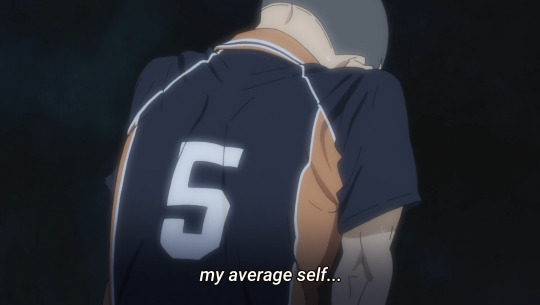

TANAKA APPRECIATION DAY STARTS NOW
-THIS WHOLE EPISODE ABOUT HIM IS PERFECTLY WRITTEN, THE IMPACT IS BEAUTIFUL, AND I HAVE GROWN TO LOVE HIS CHARACTER SO MUCH MORE.
-TANAKA DOESN'T GIVE UP. that thought alone seems boring when you read it just like that, right? but this episode, ugh, man. it surfaced a whole new concept, you'd think the character was a genuine human, a real person from this world.
-how, exactly? let's start with the things that happened to Tanaka-senpai. ‘‘embarrassment. failure. yet despite that-you refused to give in, and you constantly repeated that in your mind. yet you still ended up getting even more disappointed than you initially were. nothing was going smoothly, and you didn't know why. 'it's okay. i'll keep going, it'll be alright.' you result to self encouragement, because it really isn't the time to feel down, just stay positive. force yourself to be.’’ was the type of situation he was in. normally, a person would give in to the despair, the negativity their mind kept bringing to them. because, i mean, what else could they do? everything was going wrong right in front of their eyes. and when they tried bringing themselves up again, their own teammate refused to help. getting them to toss to you after you called for one could've been the chance to redeem yourself, but no, it didn't. in a normal situation, you'd think ‘okok they might have a plan/they prolly have a better chance at scoring’ or ‘psh maybe next time.’ or even go ‘asjdjfjfj that was embarrassing!’ pretty much any thought, usually it wouldn't give a huge impact to you, and you're able to brush it off after a couple minutes then focus on the game again. but if its like the situation Tanaka was in? completely different scenario. it's likely to give more than a stab to your morale. could even serve as the final blow. even Bokuta-san knew this, as seen from how he passed out afterwards watching them. (maybe it's due to the relief that karasuno scored, tho his attention mostly focused on Tanaka, as once again shown from his reaction after Tanaka earned a point. plus the fact that he was aware of how he, himself would act if he's in Tanaka's position.) but, did that 'deal the final blow'? did it finally make him give up? nope, it didn't. (part of the credit goes to our sunshine child Shoyo, thank hEAVENS for this angel.) and even if Shoyo wasn't there to encourage him, i doubt he would've acted differently. it takes such an impossible amount of mental strength to survive those kind of life difficulties, moreover in sports. s p o r t s, where one mistake could ruin everything. and Tanaka-san had that strength. it merely showed it's pique on the very end, but he had it from the very beginning. hence, again, i doubt a different outcome—and i find that so so beautiful, bc honestly, let's be realistic here. not a lot of people could do that. they may try, but they can only reach so far before giving in. Tanaka was one of those rare gems, and this episode was incredibly inspirational about it. i just can't say that enough. it's anime, fictional. yet the emotions, the struggles and how it was depicted were more than on point, and that's why it's capable of such impact. hhhhhhhhhhhhhhhh-
-i dare say more; let's move onto his quotes. “i'm nothing but average. but still, my average self.. do you really have time to look down like that?” ohmygod. this needs to be my life motto. Tanaka-senpai you outstandingly positive man, i crave for his attitude-his viewpoint, way of dealing with sitautions and everything. it's so cool and awesome and just aAAAAA, how?! how is one capable of such thoughts?? please teach me. i beg of you. “i'm pretty sure i'm a normal human being. especially when it comes to my build and abilities. when i was a kid, i was convinced i was a genius. i might've thought that until i was in middle school. actually, i'm still sorta convinced that i am. but i'm probably never going to be 180cm tall. i'm confident in my athletic skills. but on our volleyball team, i'm not number one in anything at this point in time. but that's not a reason to quit, nor is it an excuse.” i'm screaming. just slapped the perspective and words i've longed to hear. what an ace, Tanaka-senpai deserves that title so much. it fits so perfectly. “as long as i keep trying until i can do it... i can actually do it!” yes, thank you, Tanaka-senpai, Furudate-sensei, for proving that giving up is just an illusion of success. once you've tried enough and you can finally do it, you've finally done it. it's possible.
I REPEAT, TANAKA RYUUNOSUKE DESERVES SO MUCH APPRECIATION. HE'S SUCH A BEAUTIFULLY WRITTEN CHARACTER, AND WE ALL SHOULD SHOWER OUR LOVE TO HIM.
p.s i wrote this on the spur of the moment, (milliseconds after the episode ended) pardon if i dont make sense<3 just love tanaka ryuunosuke<3 thats all you need to know<33
#FIGHT ME.#haikyuu!!#haikyuu#haikyū!!#haikyuu icons#tanaka ryuunosuke#tanaka#tanaka headcanons#tanaka saeko#haikyuu tanaka#hq!!#hq!! anime#hq!! fanart#hq#hq art#hq fluff#hq manga#shoyo hinata#kagehina#hinata shoyo#hinata#kageyama icons#kageyama x hinata#kageyama tobio#kageyama#kenma#akaashi keiji#bokuto kotaro#bokuto#kiyoko shimizu
465 notes
·
View notes
Video
tumblr
The Making (and Re-Making) of Timothée Chalamet
BY DANIEL RILEY / PHOTOGRAPHY BY RENELL MEDRANO
He found superstardom and artistic acclaim instantaneously. Now, with unique candor, the actor of a generation reveals what it’s like to come of age in our very upside-down era.
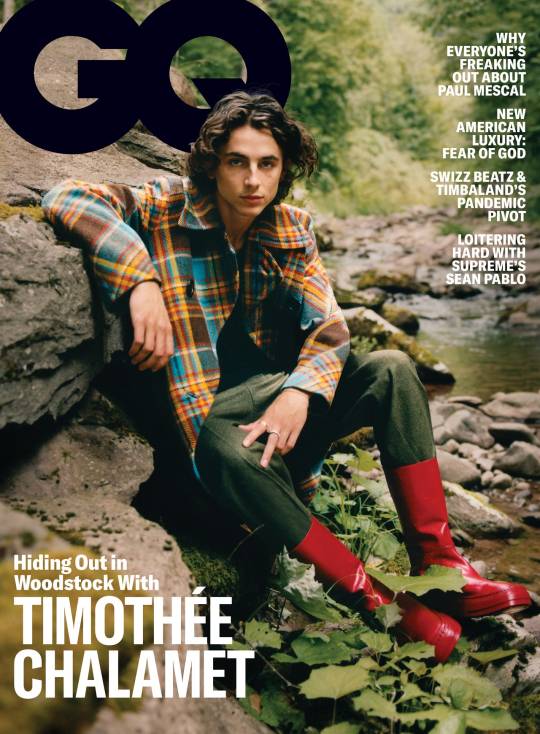
The day after the Oscars in 2018, everything that had changed, changed back again. Timothée Chalamet had spent the previous months becoming known. He had acted in a film, Call Me by Your Name, which was critically acclaimed as well as an instant object of cultish admiration—and his performance had made him, at 22, the youngest person nominated for best actor in 80 years. He had, simultaneously, been transformed into the rarest of pop confections—fawned over by younger women, older men, and every demographic in between. And he had traveled without pause on the awards circuit since early autumn, back and forth from New York and Los Angeles, practically living out of the first-class lounge and the lobbies of the Bowery Hotel and the Sunset Tower.
But the day after the Oscars, the moment the clock struck midnight and his carriage turned into a pumpkin, Chalamet was right back where he'd been before the whole fantasy had begun: in New York, with no credit card, no apartment, and no longer any structured demands on his time and attention. Outsiders who had witnessed the arrival may have regarded this 22-year-old as being in possession of wealth and clout, but he was suddenly back on his own dime, which amounted to maybe five or six dimes, reticent to stay with family and friends whose lives he felt he was disrupting with all his new baggage. Of course they couldn't possibly comprehend the chemical reaction that had just transpired. They were still hydrogen and oxygen, and Timothée Chalamet was all of a sudden water.
And so, for three weeks, he disappeared into the wallpaper of the Lower East Side. Specifically, the wallpaper of a little apartment that the French street artist JR kept for visiting collaborators. Chalamet holed up against the ugly New York weather of late winter, and did the only thing he could think to do: learn lines. The King would be his first film since his pivot into fame, and he was anxious to get back to acting after such a long stretch of merely talking about acting. Even more, he needed to blot out the unrecognizable icon the internet was already beginning to make of Timothée Chalamet.
I met Timothée for the first time at the onset of that initial blush of fame, when all of us were being introduced to an actor who had both rare talent and the un-engineerable it that chings like an audible sparkle off a jewel in a cartoon. I wrote a story for this magazine about that first chapter in the arrival of a film star. This is the second chapter, the story of what's happened since. It wasn't evident yet, but those three weeks in New York in 2018 were the starting line of what would amount to a 30-month stretch of four new films, two new Oscar campaigns, some refreshing romance, an incessant awareness of the confusing image of himself as—what else to call it?—an emerging global movie star, and a constant concerted effort to figure himself out as both a young actor and a young person in the unceasing spotlight.
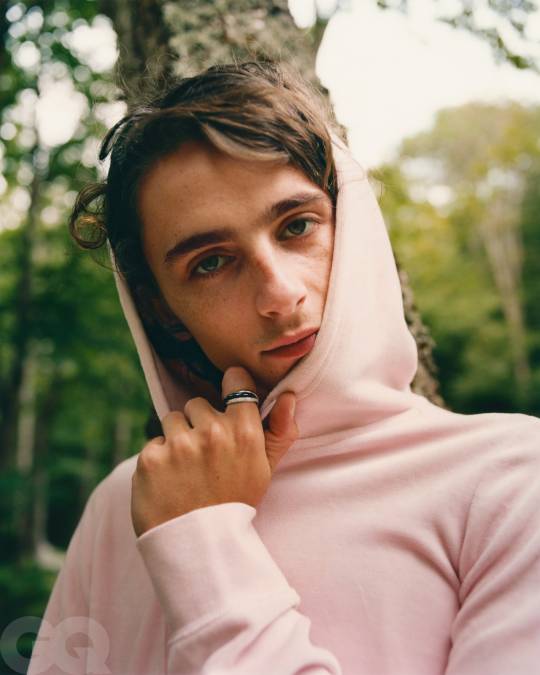
This summer, we were talking about all this on a little screened porch out back of a modest cabin in Woodstock when Chalamet recalled those three weeks. “My world had flipped,” he said. “But if I kicked it with my friends, things could still feel the same. I was trying to marry these two realities. But I don't even think I knew that was what I was doing. That dissonance was real. And thank God. Because I feel like if I'd caught up to it immediately, I would've been a psychopath or something.”
Out on that porch, I asked him a version of the same question over and over: What had the last two and a half years been like for him, as a human being? His response was a multi-hour monologue that I would characterize as: intense. He expressed unadulterated gratitude for his great good fortune. But he also expressed confusion and tension. He is firmly in a moment when he is concerned that everything he says or does or thinks will look or sound wrong. He backtracked a lot (“Wait, let me try that again”). He jumped on and off the record (“Sorry, sorry, sorry, this is just for you…”). It was important for me to know, he said, in order to communicate the context of his experience, if not the specifics.
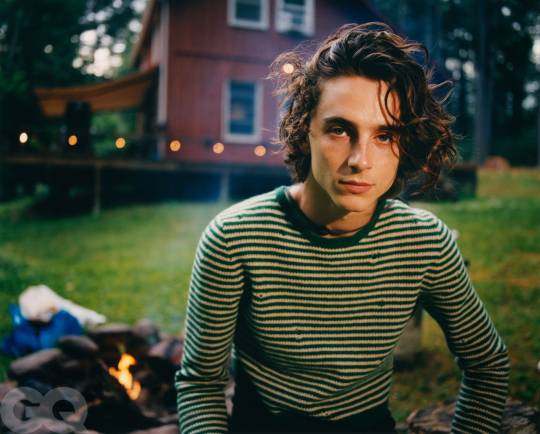
.
“I want to get back to the undefined space again. I'm chasing a feeling.”
He lives in the same world all of us do—only with the potential for adoration and blowback turned up to 11. He seems, at once, to trust his own instincts while also second-guessing most thoughts the moment he's convinced of them. It is an exhausting way to be. At times, when he was up on his feet, in his T-shirt and shorts, pacing around the little screened porch, hands tugging at his mane, I could feel the gears grinding to the point of smoke. He wanted so desperately to get this right, to express what he really meant, to feel the right feelings, to live the right way, to be the right kind of man for the people in his life that he knows he can and should be, despite everything else, despite the noise. He's doing his best.
Timothée had rented the house for the month of July, as a little escape but also as an opportunity. He was slated to play Bob Dylan in a new biopic. No telling when it might film, given everything, but for now he had more time to himself than he'd had in years, which meant time to maybe huff the vapors of some Woodstock Dylanalia. “It's not like I'm suffering from lack of connection otherwise,” he said, “but it just really feels like I'm connecting to something here.” When he arrived, he discovered that his little house had a wall devoted to Dylan—to the albums he'd recorded in the run-up to his timeout in Woodstock in the late '60s. Timothée relished happening upon that wall his first day in the Airbnb. The universe offered signs if you nudged it toward coherence.
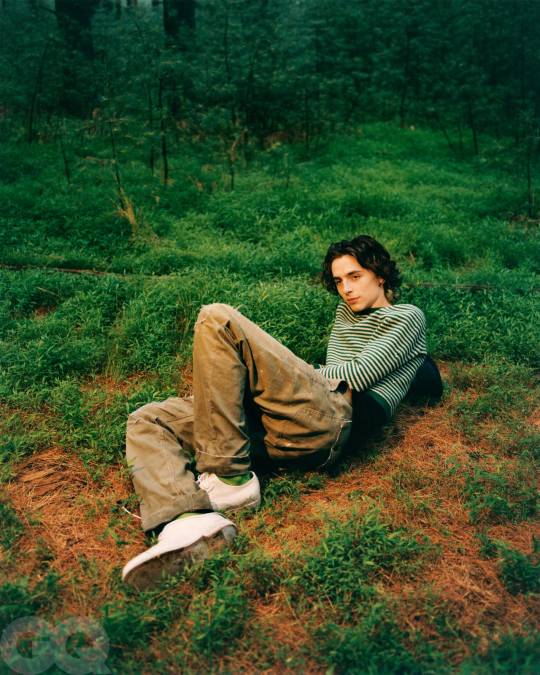
He knew what the cabin might seem like—like some young actor taking himself way too seriously, “treating himself like an artist.” But he was back and forth between Woodstock and New York all month, bombing up and down the interstate in the Honda sedan he'd rented from Enterprise. (He learned how to drive on Beautiful Boy.) All the while Dylan was top of mind. Timothée was late to the party but helplessly obsessed. He quoted him generously. He fixated on both the art and the persona. He marveled at the way the artist could be out there so much, making such an impact, while also keeping the real person obscured behind the music, the characters in the songs, the language. In the city, we spent time walking around Greenwich Village, Timothée in an identity-concealing face mask and bucket hat and sunglasses, able to search out old Dylan addresses in an invisibility cloak. He ran from site to site, with notes he'd kept while reading Dylan's memoir, Chronicles: Volume One, barreling up stairs and peering into windows. He was a 24-year-old actor, taking advantage of the pause between the second phase of his career and the third and thinking hard, daily, about how to play the next few years.
He rented the house in Woodstock, too, so that he could have a little space all to himself. He craved the privacy to try things and to fuck up. To make small mistakes now, out of view, when it was just him, when he was still young, so that he didn't have to worry about it later. At one point, he stood up and slapped an empty water bottle off the table so that it clattered against the screen of the porch. “I want to know what that sounds like!” he shouted. He hadn't taken many missteps yet, and it made him uncomfortable, wary, that he would someday. The month felt like a controlled burn. In the most innocent way, that was what Woodstock was about. He got to practice his guitar and harmonica in peace, cook himself his “shitty pasta” without judgment, permit himself space to keep growing up. So much was in the spotlight now. But in that cabin, he could sit on the couch for a while and re-familiarize himself with “the crease in the cushion” that he'd lost touch with over the past few years. The quiet. The stillness. That sunlight there coming through the trees. He could breathe a little. Sleep a little. It had all been so good for him so far. But the goodness made him anxious. When will the other shoe drop? Not there. He'd deleted Instagram off his phone. He'd stopped posting on Twitter. He was reading again. Listening to albums all the way through. Slowing down. What was it like to have lived these past two and a half years? It was like a lot of things, but here at the end of it, it just felt good to sleep.

Back at the start of the 30-month run that led to Woodstock, Timothée turned over the keys to JR's studio and went to Europe to shoot The King. The role was like none of the films he'd just received notice for. “Here I am on set with all these Hungarian men with scars on their faces, and they're like, ‘You're the center of the shot, you're the badass! And we know you tried to put on all this weight, but like: You're wearing all the chain mail.’ If they took the chain mail off, my throat is still this big…” There he was trying to keep in perspective this new fame, this new validation, this new temptation toward ego, all while being thrust into the center of “something called The motherfucking King.”
When he returned to New York that summer, he skipped off the atmosphere again with another awkward reentry. One moment he was on the battlefield of the biggest-budget drama he'd yet experienced, the next he was “back in New York, on the A/C/E at Port Authority, just like, What the fuck is going on?” It was a pattern over the past few years. The calmly intense immersion into work, the “thud of lost purpose,” as he called it, when the work ended. It happened the same way in the fall of 2018 with Little Women—reunited with Greta Gerwig and Saoirse Ronan and the crew from Lady Bird. There was just an ease with which he plugged in with them, “a vocabulary of friendship” that existed there.
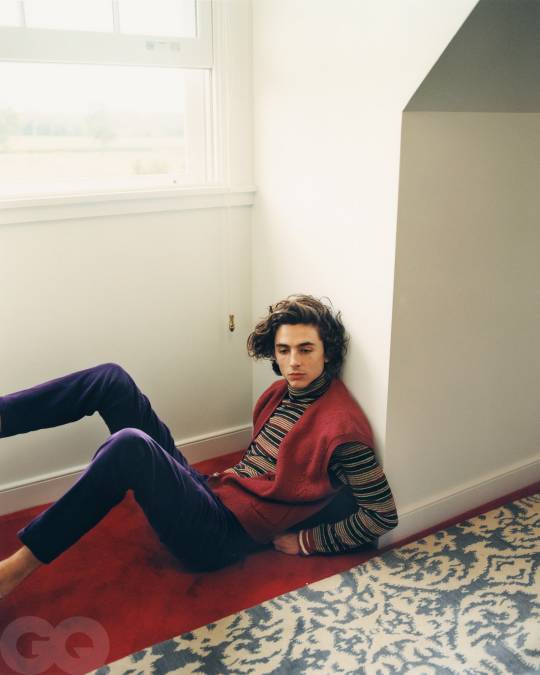
Timothée's career thus far has been filled with these sorts of friendships, notably those across generational lines. Even a casual observer may have picked up on it. Those glommings-on to older people in his life. Armie Hammer. Kid Cudi. Greta Gerwig. When I asked Gerwig to comment on the arc she's witnessed up close, from Lady Bird to Little Women, she wrote a note about “my friend Timmy”: “It's hard for me now, because I'm his friend, to see him strategically.… I love talking to him. We can get on the phone and talk for an hour or more without even realizing it, just skipping from subject to subject, making jokes, me feeling old and happy and him being funny and anxious and delightfully all over the place.” It's an odd gap he finds himself in—forced to be more accelerated than most 24-year-olds while also having not lived enough life yet to fit in absolutely with the people he enjoys spending time with most. On a recent visit with his grandmother in New York, she surprised him by saying, “I wish you would hang out with people your own age more often. It must be so weird.” It made him chuckle. Even she'd noticed. She might be right. But how could he resist the orbit of these creative geniuses he'd so long admired and who were filled with so much knowingness?
“I'm confident in the way I'm trying to approach things now, how I'm setting up the angles.”
In the winter of 2019, another Oscar campaign left him feeling disoriented all over again. Everything, Timothée said, was exactly the same as the first time except him. He'd put in this undeniable performance, but maybe one that sparked a little less for Oscar voters than that first kiss with a stranger. Now he was in all the same rooms as before, the same lunches and dinners and cocktail parties, shaking hands with the same Academy members who showed up at everything to get a little nibble of the freshest biscuit, growling ominous things at him, like: You don't have my vote yet.… “I really don't know how to talk about this stuff, man,” he told me, “because my experience of it is at the center of it. There's just some dark energy at these things, and this time around I felt like I could see it. And yet I'm thinking, Why isn't this going the exact same way?”
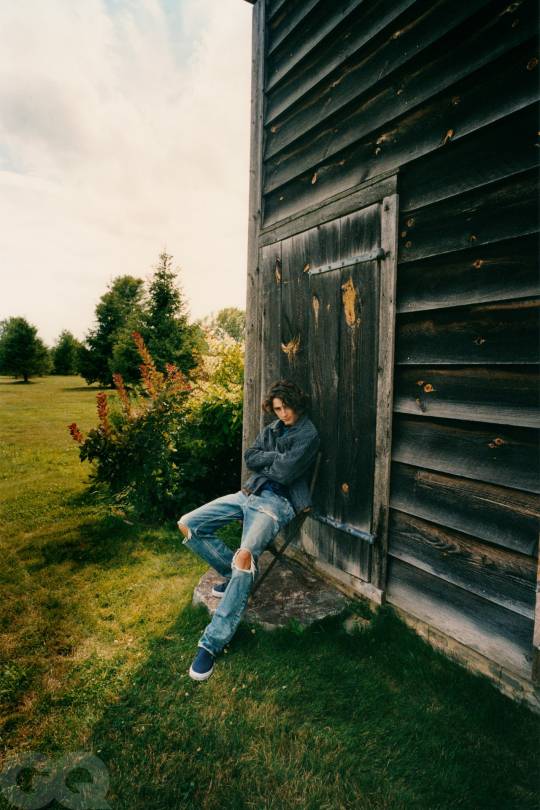
He wasn't nominated for Beautiful Boy, but the fresh air came, as it always seemed to, on the set of the next film: Wes Anderson's The French Dispatch. The movie is about a fictional English-language magazine (based on The New Yorker of the midcentury) and is structurally organized like the magazine itself, featuring short pieces at the “front” of the movie and a triptych of long features at the back. Timothée costars in the second feature, about a May '68-style student-protest leader named Zeffirelli and the middle-aged magazine journalist (Frances McDormand) assigned to report on his cause.
“I had seen Timmy in Lady Bird and Call Me by Your Name,” Anderson wrote to me, “and I never had the inconvenience of ever thinking of anybody else for this role even for a second. I knew he was exactly right, and plus: He speaks French and looks like he might actually have walked right out of an Éric Rohmer movie. Some time around 1985. A slow train from Paris, a backpack, a beach for 10 days in bad weather. He's not any kind of type—but the New Wave would have had a happy place for him.”
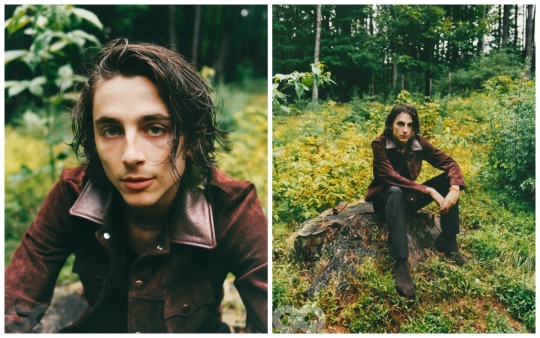
The privilege of early fame that Timothée most appreciates is the ability to choose the directors he works with. His role in The French Dispatch is a minor one, but it's a Wes Anderson movie—it's as simple as that. Due to the episodic nature of the film, some of the other “stories” were already being shot when Timothée arrived in Angoulême, a town that reminded him of the one he spent time in growing up, “so French it was like a caricature,” he said. Timothée had the opportunity, then, to hang with some of the elders he doesn't act with, like Jeffrey Wright, Bill Murray, and other seasoned members of the Wes Anderson troupe. “It was immediately as if it wasn't his first time with our group,” Anderson explained. “He was somehow already part of the family. The youngest member.”
Timothée had seen McDormand around for years, but he'd never felt like she was someone he could approach. “We'd shared an agent,” he said. “And it was no disrespect to me, but I hadn't been in any movies yet. What business do I have talking to Frances McDormand? But now, and this is the gift of acting, I really feel myself coming into my own as a community of thespians, as opposed to actors. And man, that sounds pretentious, but I just mean it's not about the fucked-up ladder of success and un-success, and being the guy or the girl, and then being off the list… That's not what I'm talking about with her on set, that's not what she's espousing to me. She's talking about a long career. She's talking about marriage with a creative partner and consultant. So to be able to have conversations like that and then a story line in the movie where they're kind of on an equal field? Even if she's an experienced, wise woman and he's an idealistic, naive boy? That's the exact relationship of exchange I want with my intergenerational peers.”
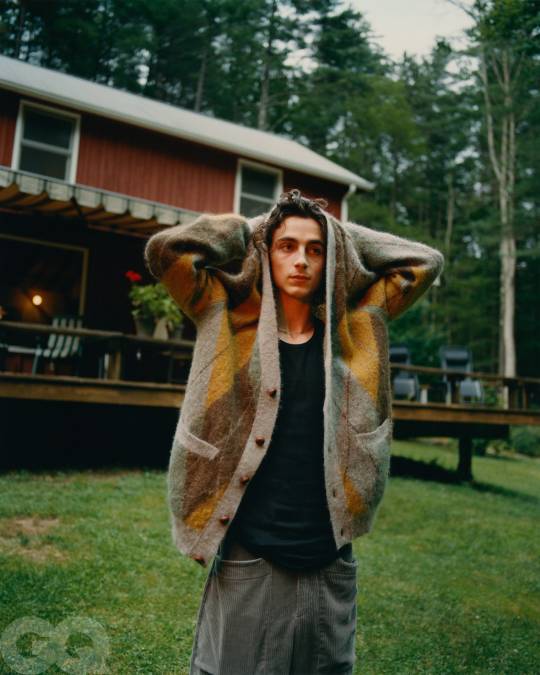
There's a particularly memorable scene in The French Dispatch, reporter and subject having fallen into bed together, when there's a knock at the door. Timothée looks at McDormand, anxious about who's there, mortified when McDormand informs him it's his mother. There, in that scene, we see all the desire of Zeffirelli—this energetic young man with all the right intentions, who strains to be intellectually and emotionally riper—clash with the reality of his age. It felt familiar to me, and no doubt to Timothée. It was some of my favorite acting in the film. I asked McDormand if there was anything in their scenes that struck her as particularly mature for someone his age. “Maturity is not something a fellow actor is the most concerned with,” she said. “Playfulness, discipline, and rigor. I do recall, during our scene in bed, the crew responding to his work with true respect for his focus. He was bringing it and we sat up and paid attention.” Anderson added: “I think my favorite moments with Timmy during a scene were the ones where I saw him pause and find a new attack. A new angle, which he does very clearly and assertively. What I love is how he will surprise you with something new, completely unexpected and perfect.”
One night, while McDormand was shooting a scene without Timothée, her husband, Joel Coen—he of the Brothers—asked Timothée if he wanted to go out for a steak. Over dinner, Timothée grilled Coen about Dylan. He knew Coen was a fan and had steeped in it on Inside Llewyn Davis. “He almost seemed weary of even talking about this stuff, it was so big and potent,” Timothée told me. But Coen noted that the truly incredible thing about Dylan was not so much the quality, which was obvious, but the quantity—the rapid amount of work in short succession, one groundbreaking album after another, in those early years. That takeaway resonated deeply with Timothée. Especially as he reflected on it from summer 2020, during the pause, during the moment of no work. That gush from Dylan made him want to work—harder, longer, better, more.
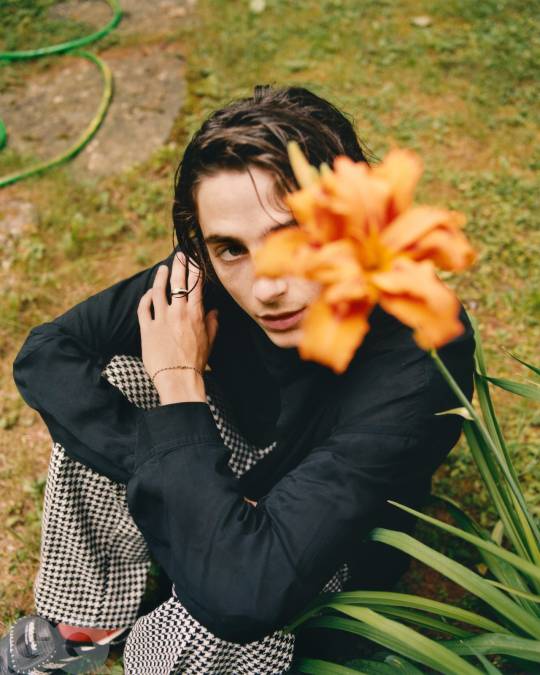
A week after our conversation in Woodstock, Timothée and I were in New York City, sitting on a bench along the Hudson, talking about what he's looking for when work resumes. “I want to get back to the undefined space again,” he said. “I'm chasing a feeling. When you think you're doing some great thing, it's probably something you've done before, and when you really fucking have no clue, that's when you're doing something on the edge, good or bad.”
Timothée's mask had slipped down his face as he was saying this, and two young women, about his age, approached cautiously. “Would you mind if we got a…,” they asked, and he hopped up without hesitation. “How'd you recognize me?” he said, friendly, but genuinely curious, as if he hadn't just been shouting about art in a voice that sounded a lot like Laurie from Little Women or Timmy from late-night shows.
“Was it the scrawny limbs or the hair?” I asked him as he sat back down.
“Definitely the first.”
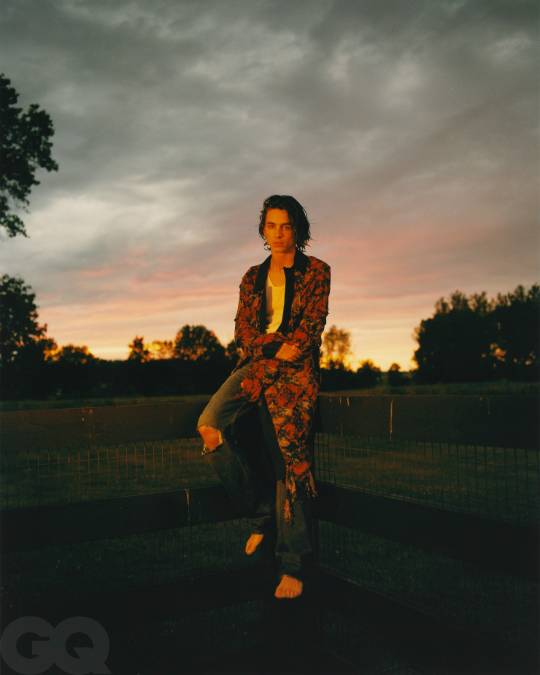
From France, last spring, it was straight to Hungary—right back to the exact apartment in Budapest he'd stayed in while shooting The King—to start work on Dune. Very few actors had become as famous without a blockbuster. And while he'd really gotten it down how to act on an indie set, how to make every second and every take count, he knew this would be something altogether different. It wasn't just the shoot that would prove taxing. A film of Dune's scale would likely be the can opener to a whole other stratum of Hollywood prominence.
Director Denis Villeneuve told me Timothée was his “first and only choice” to play Paul Atreides, “the one name on the page.” When they met to discuss the prospect, Villeneuve told Timothée how happy he was to finally meet the young actor. And Timothée had to remind him that they'd met before, when Timothée read for Villeneuve's Prisoners. “ ‘Of course!’ ” Villeneuve remembered. “He did a great audition, but he didn't physically fit the part. He was probably swearing at me because I didn't take him.” Timothée was party to so many stories like that one—glancing interactions with these heroes of his before he'd broken through. It reminded me of the relationship between freshmen and seniors in high school. The freshmen remember everything about the seniors; the seniors hardly notice the freshmen. But we all become peers eventually.
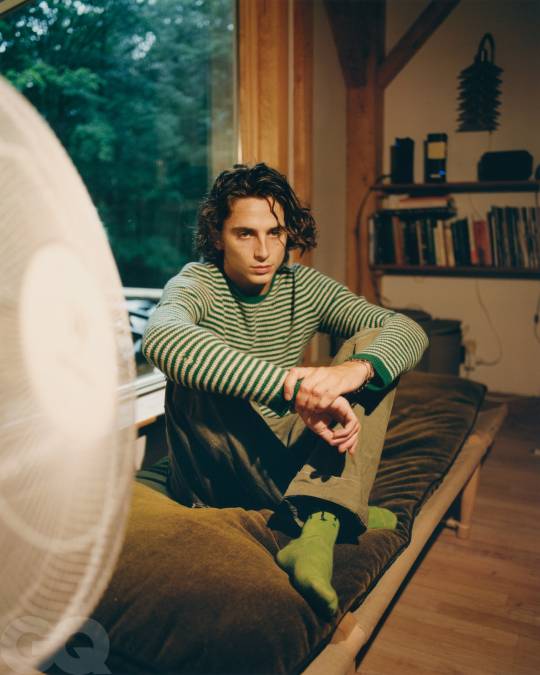
“I felt there was one being on this planet right now that would be able to portray Paul Atreides,” Villeneuve said—referring to the hero of the 1965 Frank Herbert novel, who transforms from an unassuming heir into a messiah figure, a charismatic outsider and commander of men and women (and sandworms). I read Dune for the first time this summer and was shocked by the source material, how much I'd consumed in culture that had borrowed from it. Star Wars. Alien. The Matrix. Game of Thrones. Paul, therefore, is a type we're familiar with but also possessing singular characteristics Villeneuve wanted Timothée for: “He has a deep, deep intelligence in the eyes. Something you cannot fake. The kid is brilliant. Very intellectual, very strong. And you see that in the eyes. He also has a very old soul. You feel that he has already lived through several lives. And at the same time, he looks so young on camera. Sometimes he'd look almost 14 years old. He has this kind of general youth in his features and the contrast with the old-soul quality in his eyes—it's a kid that knows more about life than his age. Finally: He has that beautiful charisma, the charisma of a rock star. That Paul will lead the whole population of a planet later. Timothée has that kind of instant charisma onscreen that you can find only sometimes in the Old Hollywood stars from the '20s. There's something of a romantic beauty to him. A cross of aristocracy and being a bum at the same time. I mean, Timothée is Paul Atreides for me. It was a big relief that he agreed, because I had no plan b.”
“If I get hit by a truck next week, I'm looking at 20 to 23, I don't know if you can top that.”
I asked Villeneuve if he noticed Timothée struggling at all to adjust to the larger-scale production. “It didn't show when he was on set, but I think for him the big thing was to learn how to create his own bubble on set. So that he would not have to try to be the friend of everyone. When you're on a smaller set, when there's 25 people, you can be friendly with 25 people. When there's 800 people around, you cannot be friends with 800 people.” He chuckled. “It's too much. So how to save your energy, how to focus, how to give himself permission to be in his bubble and make sure that his bubble is respected.”
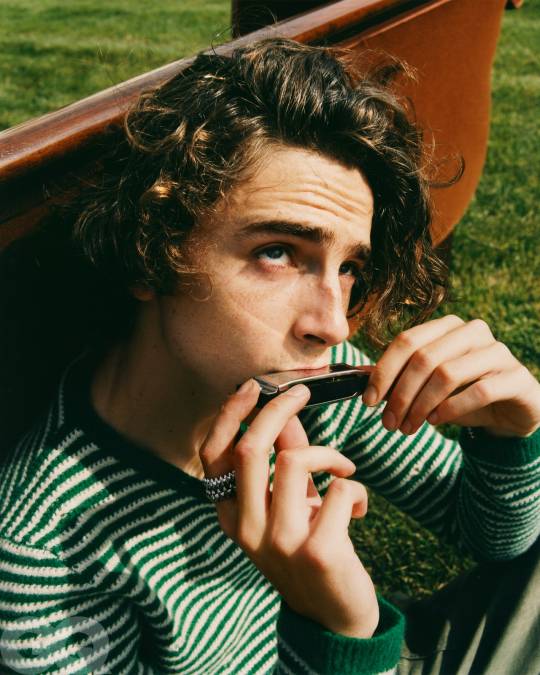
As ever, Timothée had a special affinity with those people on set who were a little older, a little wiser. Villeneuve said Timothée was constantly speaking with him and his wife in this open, vulnerable way about his concerns, his fears, how to deal with certain pressures. Villeneuve also described for me Timothée's relationships with his fellow actors, particularly the trio of Josh Brolin, Oscar Isaac, and Jason Momoa. “I felt like Timothée was deeply seduced—or maybe not seduced, but I just felt it was like a kid being with older brothers,” Villeneuve said. “He was younger, he was the little one on set, and everybody loved him. There's a scene in the movie where Timothée runs into the arms of Jason Momoa, and Jason grabs him like a puppy and lifts him into the air like he was a feather. And that's real! They really loved each other. It was very beautiful to see this young man being influenced by these people he admires.”
“His positive energy is infectious,” Zendaya, his nearest peer in the film, told me. “He really is so much fun to be around. We have very similar humor, and we can keep a joke going for a long time, but when the cameras start rolling and it's time to work, you can see it's game time, and he just taps into this brilliant intensity. It's awesome to witness.” Villeneuve underlined the energy as well, describing for me just having seen Timothée the night before we spoke, and marveling at “that beautiful, strong candor.”
“I will say that looking at Timothée working, I had a deep feeling that I was watching the birth of something,” Villeneuve added. “Not that it's for me—I say that with humility, because I feel that birth in all the movies he's done so far. I'm feeling it's someone that has insane potential. When I say potential, I don't want to reduce what he's doing right now, not at all. It's just that sometimes you are in front of somebody and you have the feeling you are in contact with a strong artist and that artist, his identity is still growing, building itself, learning its boundaries, learning how to protect some part of it. I think that we are witnessing something beautiful right now.”
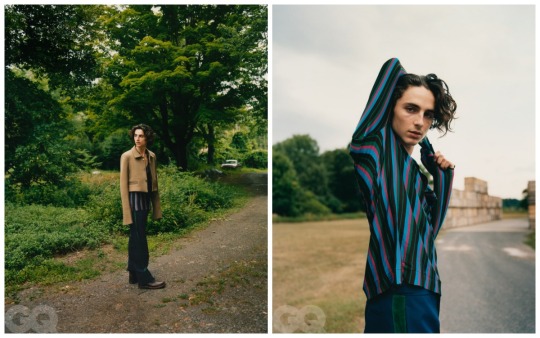
At the end of summer 2019, Timothée finally resurfaced from Planet Dune. He had been on social media only sporadically while shooting for most of 2019, and so, for his vast base of fans, it was an overdue glimpse of the object of their affection. First up was the Venice Film Festival and the premiere of The King. There were clothes and Kid Cudi cameos and charming red-carpet interviews. It was an example of the sort of stretch, in the gaps between shoots, when Timothée could indulge his passions for hip-hop and fashion and all these things he'd loved all his life that were suddenly accessible. It was another of the delirious disorientations of the past few years—the way that people who were once subjects of his intense fandom were suddenly a part of his life as friends or acquaintances happy to have him around. He might still embarrass himself at times, helplessly rapping back lyrics to his hip-hop heroes or gushing like a broken dam about new music or clothes or art made by the makers in his life, but they were cool with him so long as he actually kept his cool.
Timothée also spent the end of last summer promoting The King, alongside his costar Lily-Rose Depp, whom he'd been dating for about a year. He is serious about keeping his former relationship with Depp to himself, but he did share one very sweet, very funny, very sad anecdote that encapsulates the spectrum of great and terrible that accompanies the private life of someone new to mega-fame like Timothée.
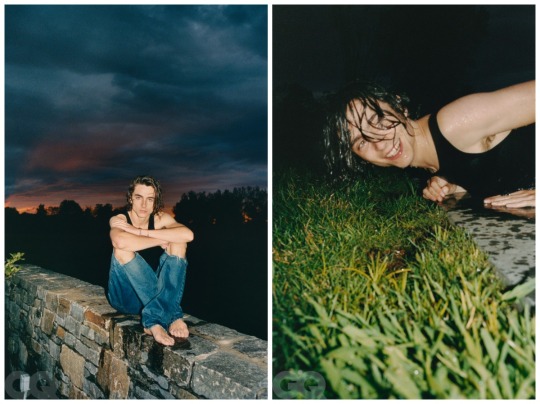
After Venice, he and Lily-Rose took a few days for themselves in Capri, where they were photographed by paparazzi. One image, in particular, circulated in which they were making out on the deck of a boat. Timothée is contorting himself into the kiss and looks a little awkward. Many people had their laughs. And some even suggested that the photo was staged for publicity. “I went to bed that night thinking that was one of the best days of my life,” Timothée told me. “I was on this boat all day with someone I really loved, and closing my eyes, I was like, indisputably, ‘That was great.’ And then waking up to all these pictures, and feeling embarrassed, and looking like a real nob? All pale? And then people are like: This is a P.R. stunt. A P.R. stunt?! Do you think I'd want to look like that in front of all of you?!”
This was how things worked now. He'd disappeared into those four straight films and emerged into a new paradigm—one that followed him into the holiday season of last year and a whole new level of exposure with Little Women. Here was this film about sisterhood, female intimacy, and a feminist critique of art and commerce. And yet Timothée was still the shiniest object in the set for so many fans. “I'm very used to answering questions about Timothée's hair from 15-year-old girls,” Saoirse Ronan joked with me. “I imagine that's probably what you're going to ask me about?”
Ronan has the unique perspective of having filmed and then promoted two movies with Chalamet during the past three years, and has as clear an eye as anyone onto this early phase of his career. “He's had such incredible opportunities, and he doesn't let the reality of that pass him by,” she said. “He's incredibly gracious and grateful in relation to his work and the people he works with. I think he's become more open as an actor. He knows his instrument more. I think he works even harder now because there are projects that are on his shoulders in a way that they weren't before. And of course he's been totally catapulted into this whole other realm of attention and notoriety. So he's also having to balance the incredible fame and attention, which would completely freak me out if it was something I had to go through.”
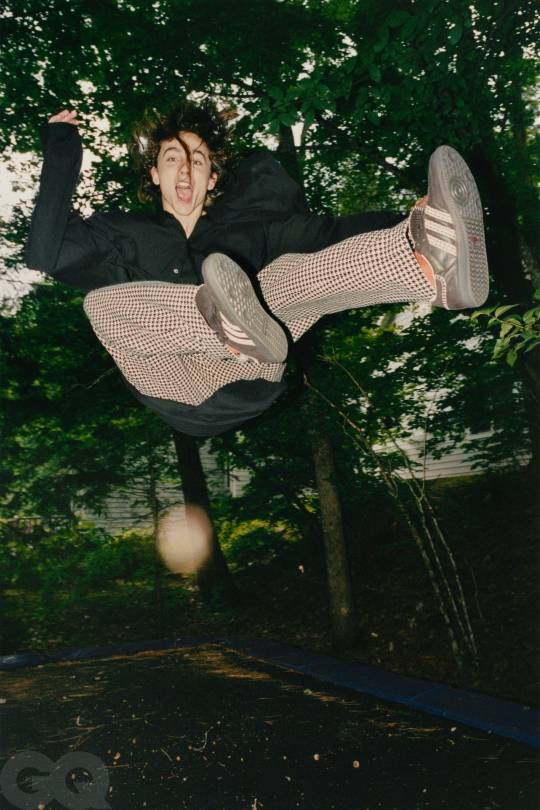
.
“I've realized that as much as these heroes of mine mean to me, and as grateful as I am when they offer me advice, even they acknowledge it's just a different thing now.”
When Timothée and I were sitting by the Hudson that afternoon back in summer, there were those two young women who approached him for a photo. But there were also two other young women who caught an eyeful of his profile as they strolled by and then surreptitiously positioned themselves out of his sight line but still in mine. They did that thing where one pretends to take a picture of the other while actually shooting back over her shoulder in selfie mode. That charade went on for five minutes or so while Timothée exercised his guts about reuniting with Gerwig and Ronan on Little Women, and though I was nodding along, I was also marveling at the lengths to which those two fans were willing to go to get a picture of him.
I asked Ronan what she's noticed about that level of attention, sitting beside him for so much of it. “I'm always kind of shocked by those things—when any one person can just completely take over people's lives so much,” she said, laughing a little incredulously. “But I'm also not surprised. There just aren't many other young male actors out there like him, who are able to hold an audience in the way that he does. His look is so magnetic and beautiful. One of the things that we spoke about a lot when we were doing Little Women, in terms of our characters, but also in terms of myself and him as people, is that we both have this masculinity and femininity equally. And I think that that's one of his strengths, is that he can be incredibly sort of feminine and sensitive and sensual, and also he's a guy that, you know, girls fancy. So he covers so much ground in terms of popularity. But at the end of the day, he's always gonna have this skill. He can be cute, but that only gets you so far.… And so I've seen him learn how to separate himself from all that other stuff when he's on set, when he's working.”
In Woodstock, Timothée had described to me with greatest admiration the way that Ronan can act in these films, at this highest level of acclaim and attention, but also remove herself, uncomplicatedly, from all the fuss: “She is like a superhero when it comes to this sort of thing, going through it so healthy—with the asterisk being excellent work across the board and four Oscar nominations. I think her, like, DNA of self is really morally right.” She knows herself extremely well, he said, and has the confidence to give up only so much of herself. Whereas he feels he is calibrating constantly how much of his true self to reveal. “Saoirse's one of my best friends in the world—at least I think we're best friends. And she's never judged me for…the Coachella of it all.” That is, the part of him that can't resist fanning out backstage with his favorite musicians or occasionally allowing himself to be in the spotlight even as he talks about preserving his privacy.
“He's 24, and he's gonna have a great time, and I would never judge him. I've been to Coachella; I just never got photographed at Coachella,” Ronan said, chuckling. “But yeah, we talk about that sort of stuff all the time. We've weirdly gone through this together for the last few years. We've both become more accessible. But he's had one sort of attention—I do feel like boys get it on a whole other level. I know that ultimately what he wants is to be good at his job. And that will always steer him on the right path. I've always let him know, and he's always let me know, we can talk to each other, and we do. He has good people around him, and I'm one of them, and Greta as well—we all kind of look out for one another.”
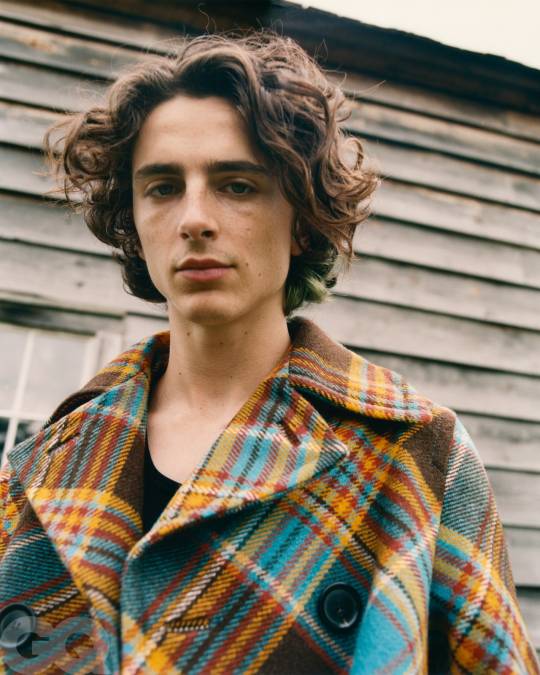
Timothée spent late May and early June asking questions of himself: What can I do? What is my role in all this? He felt conflicted when he sprang to action and conflicted when he stood still. But never did things feel less uncertain, less self-conscious, than when he was marching, anonymously, alongside hundreds or thousands of others in Los Angeles in the wake of the murder of George Floyd. It was an active way to participate—meaningful action, without being showy, without flexing any of the levers of fame or power. He was going to get hit no matter what he did, so he tried to follow his instincts of what felt humble, responsible, right.
“This idea,” he said, “that power is the mass body politic organized—and how many bodies can you get together—that makes sense to me.” He didn't disappear but, rather, stripped himself of his him-ness and became one body, among many, taking up space and participating in an unequivocal statement. ��With a mask, a hood, a hat, glasses—my face is deleted,” he explained, “and I'm literally presenting a physical form, you know?” A single body in space that, like a vote cast in an election, is democracy embodied, but anonymous. The same unit of power as anyone else. “People might find it disingenuous, but I found it really grounding,” he said. “It was Oh shit, I don't feel out of place—and yet I haven't been in a crowd like this for years.”
He spent much of the summer talking with others about how a person should be in a cultural and political moment such as this one. “After a day of protests,” he said, “I'd ask friends if they ‘felt good.’ If we do, is it a good thing to feel good, or does that mean we're doing it for the wrong reasons? How much do I want to put on social media? Is it a virtue signal to put it on social media? But all social media is performative, right?” I heard him ask dozens of self-interrogating questions like these. He cares so genuinely about doing the right thing, about doing well by his family, his friends, and his fans. But he didn't want to misuse his privilege or his platform, to overreach so that the gravity of his fame sucked up anything from anyone else whose moment it was to speak. He didn't want to take up room; he wanted to help center other voices. On Instagram, he posted videos each day during the first week of marches in Los Angeles—no directives into camera, just an implicit charge to his followers: Show up. Listen. Be a body.
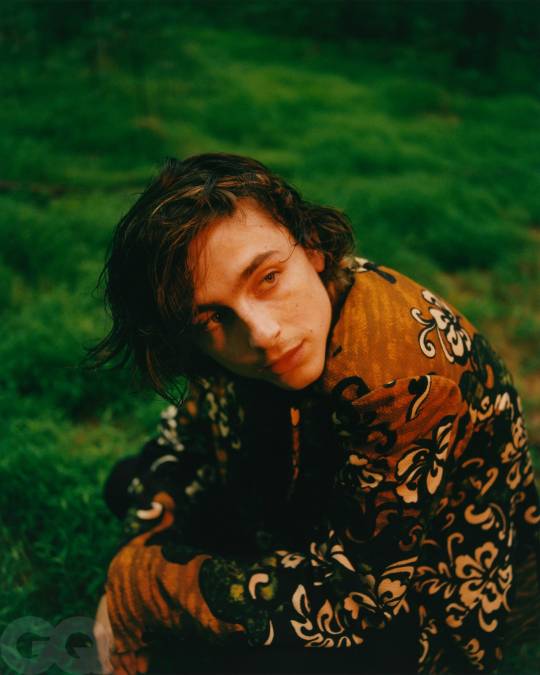
“I have so many thoughts on so much of it,” he said, “but I don't see the benefit of putting it down for consumption until I've really worked out exactly how I feel about it all. Who benefits from my half-baked ideas?” Who cannot relate to this in 2020? Who would want any of their dinnertime conversations with family and friends these past months chiseled into the stone of the internet? “I care so much about this stuff. But I would never want my caring to be misconstrued. I don't want my caring to be about me in any way.”
God, this stuff twisted him up. He knows how much has gone his way. But from the summit of good fortune and power, is it better to speak constantly—or to shut up, put on the glasses, pull down the hood, and live and act according to one's convictions as one individual among many individuals? To march. To vote. To speak through action rather than words. Staying in motion, showing up, being a body—it's a good place to start while he works out the rest of how he's meant to live a life true to his values with everyone watching.
He's seeking out the right path, the right people—with help from his “intergenerational peers” and Dylan and anyone else he can find. He wants the benefit of their knowledge and experience, and he's okay if it's slow going to accrue it. He's open to playing the role of the novice still. But there have also been things in his life these past of couple years that have made him realize, as he puts it, “adults are just kids a little bit older.” When he returned to New York from Los Angeles this summer, it wasn't to his childhood apartment or to a borrowed living space of an acquaintance. It was to his very own apartment, his first, in a little wedge of Manhattan he loved for being nowhere, but on the edge of several somewheres. He relished the mundanity of setting up his own place. To hear him talk about a first trip to CB2 was like hearing another person talk about their first trip to a movie set. “But I think if people saw what my apartment looked like, they'd be like, ‘Oh! This kid has no fucking clue what he's doing.’ ” He is so young and he is so old. It is his gift. He is so patient when he can suppress being so restless. So careful with the long arc of a career when he can resist obsessing over the instant. He is so confident when he centers on the work and so searching when he gets sucked down into questions about the rest of his life. Will he always be this way? This pliable and open? This self-reflective and intentional? He trusted so little of his new life, but he trusted his talent. That was the key. He knew he was as good as anyone at playing other people, even if he was still figuring out how to play himself.
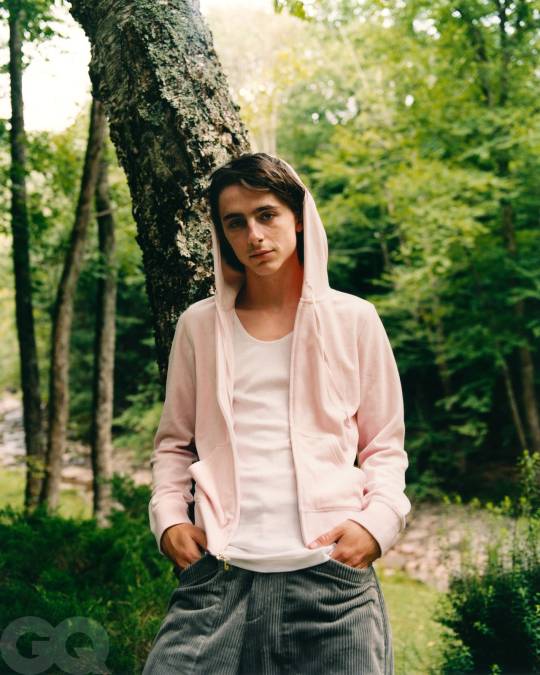
We spent a good amount of time in Woodstock and in New York City and on the phone talking about where his career might take him from here. With great humility, he acknowledges his skill. But he has been thinking a lot about the difference between preternatural talent and mastery—the work that's required to ascend from that floor of young greatness to the ceiling of realized potential. That said, he's wise enough to know that his career could pivot in an entirely different direction—that the world could change or the opportunities could dry up or “eventually there's gonna be an Oscar Isaac in his 30s who's gonna bust out of Juilliard who's gonna be the next great actor and make me feel like a piece of shit. But right now…”
He told me, “If I get hit by a truck next week, I'm looking at 20 to 23, I don't know if you can top that.” To show up with Call Me by Your Name—he knows that that film was a unicorn, the sort an actor works his whole life to find. And the immediate Oscar nomination had freed him up to not spend the rest of his career chasing a certain kind of role that might lead to a certain kind of validation. “I'm not gonna be bashing my head against a wall trying to prove that I'm an actor,” he said. “The train can run over my leg and leave a track forever, and yet the point of entry for me…,” he said, trailing. “That's a good feeling.”
He looks at all these careers—all the careers you might expect: DiCaprio, Bale, Phoenix, Depp. And he does his best to separate the strands of each of their careers that might still apply to his. But all of the rules for acting success that those performers played by, for how to be in the public eye, for career arcs and longevity—those rules are irrelevant now. Hollywood is different, the media is different, fans are different, movies are different, the world is different. “I've realized that as much as these heroes of mine mean to me, and as grateful as I am when they offer me advice, even they acknowledge it's just a different thing now.”
And so it's occurring to him that the next few years will be Timothée finding the path that's right for him. Lately, he's thought about this next phase as shining a flashlight into the dark. There are potential projects that excite him considerably, some of which he's had a greater hand in engineering. There is, of course, the Dylan movie. But there's the question of how to spend the rest of the year, when most Hollywood productions are still paused. “The rest of the year,” he says, “I'm just thinking about Trump, man.” But after that…maybe Europe for a while? The Woodstock experiment did what he'd hoped it would—a little space, somewhere else. He would love to just breathe some different air again.
He was at another pivot point, as he had been when he and I were first together for Chapter 1. In the winter of 2018, the work had been validated, the public profile had developed suddenly. But the temptations, the confusion, the money—those were all lagging indicators. By mid-2020, all had caught up. And the money, in particular, was on his mind one afternoon in New York. We were talking about how a person might stay true to one's roots with that sort of thing when the reality, for him at least, had changed with Dune. I told him that one of the things that seemed to differentiate him from young stars of the past, and perhaps was a feature of his generation, was the way that material possessions didn't consume him. He didn't buy much stuff. He didn't own a car or a house. He liked borrowing clothes, but not necessarily keeping them. He agreed with the characterization, but then got immediately twisted up about a potential future hypocrisy: “But Dan, what if I do grow to like fancy shit?!”
Boomeranging back home after the surreal adventures out in the world—that was a good and grounding thing for him. Over the weeks we were talking, he spent time with his folks, delivered some COVID groceries to his grandma, and was in touch with his sister daily. And in New York, he and I kept running into ghosts. One afternoon, when we crossed the West Side Highway at Houston Street, he gestured at the athletic complex at Pier 40, where he played soccer growing up. He scampered over to a vending machine there to grab a bottle of water. When he pulled open his wallet to pay, he had only twenties. “Bad metaphor! Bad metaphor!” he screamed, jumping away from the vending machine, as though it were one of the great threats to his selfhood. This was the sort of innocuous moment that will hum with outsize resonance for me when I think about Chapter 2 from the future. All the things that one would expect to happen had happened in the first two and a half years since the arrival of a comet, and yet he was suspicious of so much of it.
Here is another way I will remember him from this moment: sitting on that porch in Woodstock—breeze and birds in the trees, sunlight in the leaves—looking for a higher power. Or at least expressing openness, as a nonreligious person, to the idea of some central organizing force in the universe—because, given everything lately, there has to be or we're fucked, right? Some of these searching things he said to me could be mistaken as a person spinning out a little. But that wasn't it at all. There was such calm. There was such contentment with the grace that had been afforded his life and career thus far, and where each might take him next. He was questing, yes—but he was firmly at the controls. The flashlight in the dark. Someone moving forward with great confidence into the unknown, with eyes wide, mouth shut, and ears listening more than they ever had before. There were no models for how a person like him should be anymore. There were no longer any adults who weren't just kids a little bit older. There were no blueprints for how to shape a career—so much had changed. There was only a head and a heart, his, and a feeling for the moment. “Maybe I'll never do a great work of art again, but I just feel like I'm confident in the way I'm trying to approach things now, how I'm setting up the angles,” he said on that porch in Woodstock. “When you think about Dylan. When you think about what Joel Coen said about the rapidness of the art, I'm just like: Trust the beat of your own drum. Give this its best shot. Give your artistry its best shot.”
.
Daniel Riley is a GQ correspondent and the author of ‘Barcelona Days,’ which was published this past summer.
A version of this story originally appears in the November 2020 issue with the title "Wild Heart."
PRODUCTION CREDITS: Photographs by Renell Medrano Styled by Mobolaji Dawodu Tailoring by Ksenia Golub Produced by Wei-Li Wang at Hudson Hill Production
439 notes
·
View notes
Text
Research Shows that Zutara Would Have Been the Ideal Friends to Lovers Dynamic

(featured below: a very self-indulgent Zutara post that uses Facts and Evidence to be self-indulgent)
When I joined the ATLA fandom, a common trend I've seen used to discredit Zutara was the belief that upon transitioning from a platonic relationship to a romantic one, Zuko and Katara would immediately become The Worst (TM) for each other. It's quite the stretch, and the Zutara fandom nearly unanimously recognizes that. Still, since the attacks have yet to cease even 15 years after the show’s first release, I'd like to add my two-cents on the subject, along with a reference to actual research that is much harder to dismiss.
The reason why Zutara is framed as a “toxic and unhealthy” relationship is that their romance would be a classic example of the enemies-to-lovers trope, a trope which modern media has not been particularly kind to. However, when executed correctly, enemies-to-lovers can produce a healthy and loving relationship, frequently relying on friendship as an intermediate between the “enemy” and “lover” stages in the most well-executed versions of this trope. Meanwhile, the trope of friends-to-lovers is just as popular as enemies-to-lovers, though the specific dynamic required between two individuals to achieve this transition is not well-known. Recognizing this, Laura K. Guerrero and Paul A. Mongeau, both of whom are involved in relationship-related research as professors at Arizona State University, wrote a research paper on how friendships may transition into romantic relationships.
While “On Becoming ‘More Than Friends: The Transition From Friendship to Romantic Relationship” covers a variety of aspects regarding how friends may approach a budding romantic relationship, this meta will focus on the section titled “The Trajectory from Platonic Friendship to Romantic Relationship,” which describes stages of intimacy that are in common between platonic and romantic relationships.
(I am only using this one source for my meta because as much as I love research and argumentative writing, I can only give myself so much more school work before I break. If you wish to see more sources that corroborate the argument from above, refer to the end of this meta at the “Works Cited.”)
According to Guerrero and Mongeau, “...scholars have argued that intimacy is located in different types of interactions, ranging from sexual activity and physical contact to warm, cozy interactions that can occur between friends, family members, and lovers…” Guerrero and Mongeau then reference a relationship model where the initial stages (i.e. perceiving similarities, achieving rapport, and inducing self-disclosure) reflect platonic/romantic intimacy through communication while the latter stages (i.e. role-taking, achieving interpersonal role fit, and achieving dyadic crystallization) often see both individuals as achieving a higher level of intimacy that involves more self-awareness.
Definitions, because some terminology in this quote is field-specific:
_____
Perception of similarity: (similar in background, values, etc.) which contributes to pair rapport
Pair rapport: produces positive emotional and behavioral responses to the partner, promotes effective communication and instills feelings of self-validation
Self-disclosure: a process of communication by which one person reveals information about themselves to another. The information can be descriptive or evaluative and can include thoughts, feelings, aspirations, goals, failures, successes, fears, and dreams, as well as one's likes, dislikes, and favorites.
Role-taking: ability to understand the partner's perspective and empathize with his/her role in the interaction and the relationship
Role-fit: partners assess the extent of their similarities in personality, needs, and roles
Dyadic crystallization: partners become increasingly involved with each other and committed to the relationship and they form an identity as a committed couple
_____
(Source: Quizlet -- not the most reliable source, I know, but once again field-specific terms tend to be ubiquitous in their definitions, and I doubt that this Quizlet can be that inaccurate)
(Additional note: only the first three definitions will be relevant to this meta, but the other definitions are left in for all of you who want to speculate what the next part of this meta, which may or may not be published the following week, will be about.)
Let’s apply what we just learned back to the real Zuko-Katara relationship we see throughout the show. What attributes of healthy and natural friends-to-lovers dynamics may they check off?
Perceiving similarities:
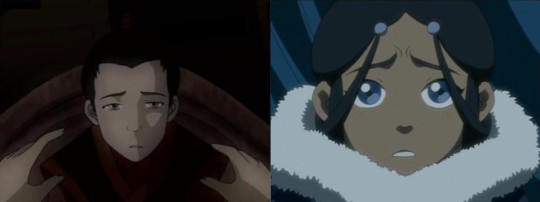
Zuko and Katara share an astounding number of parallels in background and character throughout the show. Both their mothers had sacrificed their lives to save them, and then there are many deliberate parallels drawn between Zuko and Katara’s confrontations in the Day of Black Sun and The Southern Raiders, respectively. Of course, there are more, but since I do not have much to add to this subject, I’ll say that perceiving these similarities helps contribute to…
Pair rapport:
We see three standout examples of this from the show in which Zuko and Katara “make positive emotional and behavioral responses” towards each other: In the Crossroads of Destiny, the Southern Raiders, and Sozin's Comet, Part 2: The Old Masters.

(1) Crossroads of Destiny. Zuko and Katara bond over the loss of their mothers in the Crystal Catacombs, allowing themselves to truly see the other for the first time as well as for them to speak civilly and intimately (is this self-disclosure I see?) with each other. Of course, their conversation (on-screen or off-screen) is meaningful enough for Katara to offer to use the Spirit Oasis water to heal Zuko’s scar.
(2) The Southern Raiders. The journey Zuko and Katara take for her to achieve closure (which is something Zuko himself knew was necessary to heal and grow) is the catalyst for Katara forgiving Zuko. Though there is no true “rapport” in the scene where Katara forgives him, all other banter/conversations (in the Ember Island Players and the ATLA finale) between Katara and Zuko are reliant on the moment she forgives him.
(3) Sozin's Comet, Part 2: The Old Masters. In the finale, Zuko experiences a moment of uncertainty before just before he faces his uncle -- his uncle who had always been there for him since the days of his banishment, his uncle had loved him unconditionally even when Zuko did not know that such love was possible, his uncle who loved him like his own son, his uncle who he betrayed in the Crystal Catacombs, his uncle who turned away when he was encased in crystal, too disappointed to look him in the eye. He tells this to Katara -- and what does Katara say to Zuko in response?
“Then he'll forgive you. He will.”
The dialogue speaks for itself. The positive emotional response, the open communication, and the (rightful) encouragement Katara provides, all without invalidating Zuko’s self-doubt, demonstrates the epitome of pair rapport. Further elaboration would simply be me gushing over their dynamic.
Self-disclosure:
Self-disclosure involves revealing intimate feelings. We’re revisiting the same three episodes that we covered up above since they all include self-disclosure.

(1) The Crossroads of Destiny. When he reaches out in the Crystal Catacombs, Zuko reveals something to Katara that he has never told anyone before, perhaps something he didn’t even want to admit to himself -- in response to “the Fire Nation took my mother away from me” he says “that's something we have in common.” And to say that out loud, to say it to himself and Katara when for three whole years he’s been trying to convince himself that the Fire Nation is good and that his father loves him -- there are no words to describe it. It’s both awe-inspiring and heartbreaking to see that Zuko and Katara’s shared pain is what allowed them to see each other as more than the “face of the enemy,” and it’s something so poignant that it forms an immediately profound connection between the two.
(2) The Southern Raiders. On their way to the Fire Nation communications tower on Whale Tail Island, Katara tells the story of her mother’s death, a story that has haunted her memories for years, looming over her as a ghost, a wound that festers into fear to grief to anger. This was the moment that divided Katara’s life into the Before and the After, the one that forced her to abandon childhood and to become a mother to her own brother (as implied by Sokka in his conversation with Toph in the Runaway). And yet this is the first time we see her tell someone her story in the show, full and vivid as if it happened yesterday. Because even though she mentioned her mother before to Aang, Haru, and Jet in order to sympathize with them -- it’s just that. Sympathizing. This time she tells Zuko about her mother’s death for her own sake rather than for another’s. And it’s an incredibly intimate moment, one that is made even more fragile, wrenching, and beautiful by Zuko’s response -- “Your mother was a brave woman.”
(3) Sozin's Comet, Part 2: The Old Masters. Throughout the second half of season 3, Zuko shares his love and insecurities regarding Iroh to every member of the GAang.
In the Firebending Masters, he mentions to Aang offhandedly -- and perhaps too offhandedly, as if he didn’t want to believe it himself -- that Iroh, Dragon of the West, received his honorary title for killing the last dragon.
An episode later in part one of the Boiling Rock, Zuko talks about his uncle with near constancy. He brews tea for the GAang and (endearingly) tries retelling “Uncle’s favorite tea joke.” He tells Sokka, “Hey, hold on. Not everyone in my family is like that… I meant my uncle. He was more of a father to me. And I really let him down.” He (fails at, adorably) giving advice to Sokka when the rescue mission to the Boiling Rock has begun to look helpless, asking himself “what would Uncle say?” before completely floundering away.
Then, in the Ember Island Players, he shares a sweet moment with Toph, bitterly spitting out that
“...for me, [the play] takes all the mistakes I've made in my life, and shoves them back in my face. My uncle, he's always been on my side, even when things were bad. He was there for me, he taught me so much, and how do I repay him? With a knife in his back. It's my greatest regret, and I may never get to redeem myself.”
Toph, in turn, reveals the thoughtful side to her character, the side that is almost always hidden, telling Zuko that “you have redeemed yourself to your uncle. You don't realize it, but you already have.”
And every one of these moments matter, because we see Zuko’s inner conflict (though this inner conflict does not exist to the extent at which it did at the first half of season 3) and its evolution. First, with Aang, he remains skeptical and disillusioned. Second, with Sokka, his longing for Iroh’s love and presence manifests itself in him imitating his uncle as well as he can. Third, with Toph, he finally admits everything he had been afraid of ever since he saw Iroh’s empty prison cell during the eclipse -- that Iroh is disappointed in him. That Iroh hates him. That Iroh will never accept him again.
And for a moment, with Toph’s encouraging response and Zuko’s resulting little smile, it appears as though Zuko’s internal conflict arc is concluded. But we are wrong -- because in the finale of the show, we are given the true climax and resolution to Zuko’s insecurities, fears, and self-loathing. And who is it that he shares this moment with?

It speaks volumes about Zuko and Katara’s relationship that Katara is the one to comfort Zuko in this scene, in that last moment of hesitation right before he steps inside his uncle’s tent, preparing himself to see his uncle as a completely changed person. As a person who now knows humility and unconditional love. And remember -- selecting Katara to be in this scene is a deliberate narrative choice because ATLA was written by a team of producers and writers, and perhaps even if it wasn’t, it becomes a powerful moment in which Zuko’s arc with Iroh reaches its peak.
Simply having Katara there in this scene already has such a great narrative impact, but then the show gives us some of the most intimate dialogue that Zuko, a naturally closed-off person, delivers (although his emotional outbursts may suggest otherwise, Zuko tends to hide most of his internally conflicting feelings to himself. Hence, he is always able to dramatically monologue about his honor, his country, and his throne -- because he’s trying to convince himself to play a part. But that’s another meta for another day).
Let’s begin by comparing Toph and Zuko’s dialogue with Katara and Zuko’s dialogue because both see the other party validating Zuko’s feelings.
(Warning: the following section plunges deep into the realm of speculation and overanalyzing dialogue. Regarding literature or any media, there are countless ways to interpret the source material, and this is simply one way it could be done.)
_____
Ember Island Players Dialogue:
Toph: Geez, everyone's getting so upset about their characters. Even you seem more down than usual, and that's saying something!
Zuko: You don't get it, it's different for you. You get a muscly version of yourself, taking down ten bad guys at once, and making sassy remarks.
Toph: Yeah, that's pretty great!
Zuko: But for me, it takes all the mistakes I've made in my life, and shoves them back in my face. My uncle, he's always been on my side, even when things were bad. He was there for me, he taught me so much, and how do I repay him? With a knife in his back. It's my greatest regret, and I may never get to redeem myself.
_____
Although Toph and Zuko’s dynamic is one of the most innocent and understanding throughout the show, the conversation begins with Toph joking with a negative connotation -- that “even [Zuko seemed] more down than usual, and that’s saying something!” Thus, the conversation opener is not one that allows for Zuko to easily be emotionally vulnerable, and so he responds bitterly and angrily -- “You don’t get it, it’s different for you” and “...and how do I repay him? With a knife in his back.” By stating that their portrayals in the shows were different, Zuko mentally places a wall between himself and Toph, saying that “[Toph doesn’t] get it.” Then, the rhetorical question Zuko asks himself and the shortness with which he answers the question showcases a forceful and biting tone, indicating that he is covering up his inner turmoil with vehemence. This tendency is something we’ve seen Zuko default to before, whenever he had shouted the oft-mocked “I must restore my honor!” lines in response to a few introspective questions Iroh had asked (though once again, that’s another meta for another day). Now, let’s examine the remainder of their conversation.
_____
Ember Island Players Dialogue Continued:
Toph: You have redeemed yourself to your uncle. You don't realize it, but you already have.
Zuko: How do you know?
Toph: Because I once had a long conversation with the guy, and all he would talk about was you.
Zuko: Really?
Toph: Yeah, and it was kind of annoying.
Zuko: Oh, sorry.
_____
Here we see Toph and Zuko’s conversation take a more serious turn as Toph becomes more sincere. Zuko, however, is still full of self-doubt as he is constantly questioning Toph with “how do you know?” and “really” and “oh, sorry.”
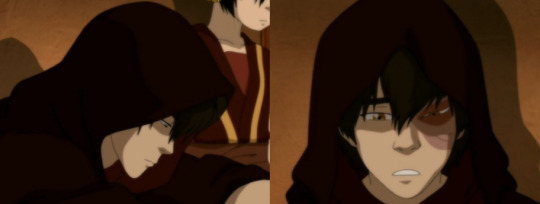
(featured up above: Zuko looking dejected and doubtful.)
Still, the conversation ends on a sweet and inspiring note:
_____
Ember Island Players Dialogue Continued:
Toph: But it was also very sweet. All your uncle wanted was for you to find your own path, and see the light. Now you're here with us. He'd be proud.
_____
Hence, though Zuko and Toph’s conversation displays a heartening and hopeful dynamic, Zuko is ultimately still guarded for the majority of their conversation. Now, let’s look at how Katara approaches Zuko in the Sozin’s Comet, Part 2: The Old Masters.
_____
Sozin’s Comet, Part 2: The Old Masters Dialogue:
Katara: Are you okay?
Zuko: No, I'm not okay. My uncle hates me, I know it. He loved and supported me in every way he could, and I still turned against him. How can I even face him?
Katara: Zuko, you're sorry for what you did, right?
Zuko: More sorry than I've been about anything in my entire life.
_____
In direct contrast to the conversation opener with Toph, Katara begins to engage Zuko with an openly concerned question. And even though Katara never disappointed an Iroh-figure in her life in the way Zuko has, Zuko immediately doesn’t close himself off from her, he doesn’t create a wall that prevents him from revealing his deepest fears to her. During this scene, he neither sounds bitter or angry -- he sounds lost, doubtful, and afraid (perhaps even afraid to hope). This shift in tone is blatant in his voice (thanks to Dante Basco’s line delivery) but even with nothing but the written dialogue, we can note the difference in which he describes his turmoil to Toph and as compared to Katara:
With Toph: “But for me, it takes all the mistakes I've made in my life, and shoves them back in my face. My uncle, he's always been on my side, even when things were bad. He was there for me, he taught me so much, and how do I repay him? With a knife in his back. It's my greatest regret, and I may never get to redeem myself.”
With Katara: “No, I'm not okay. My uncle hates me, I know it. He loved and supported me in every way he could, and I still turned against him. How can I even face him?”
With Katara, the underlying bitterness from his conversation with Toph is toned down to the point of nonexistence, though a part of it is still there. With Toph, Zuko says, “it takes all the mistakes I’ve made in my life, and shoves them back in my face,” which is a rather incensed statement. Meanwhile, by saying, “no, I'm not okay. My uncle hates me, I know it,” Zuko directly addresses his self-loathing without the use of language such as “shoves them back in my face,” the latter of which is reminiscent of how individuals may unthinkingly reveal information in a sudden emotional outburst.
Then, when Katara asks him if he’s sorry for what he did, the words come easily to Zuko, the most easily he admits to his own mistakes after three years of not admitting anything truthful to himself: “More sorry than I've been about anything in my entire life.”
And Katara, just as Toph did, says with the utmost confidence and sincerity, “Then he'll forgive you. He will.”
This moment of affirmation that runs parallel between both dialogues is where Zuko’s responses begin to diverge. Whereas Zuko reacts to Toph with disbelief and doubt, this is how he reacts once he hears Katara’s words:
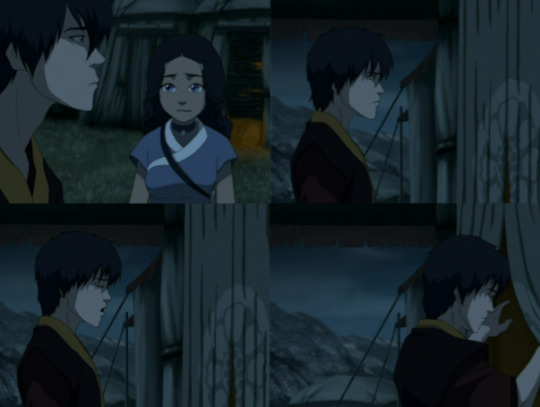
He takes Katara’s words to heart and accepts them. Because out of all the GAang, Katara is the one who knows the most about forgiving him, who most keenly feels the change he underwent since his betrayal in the catacombs. And so he stands, still nervous but no longer afraid, facing forward towards the future instead of back into his past.
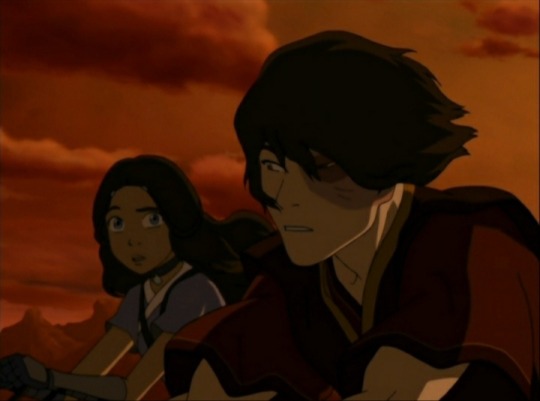
Iroh and Zuko’s relationship is one of the most important ones throughout the entire show, so to see Katara play a pivotal role in a critical point in their dynamic shows just how important Katara’s character is to Zuko (and vice versa, though in here I do touch upon the former in more detail).
Although my analysis on the self-disclosure between Zuko and Katara may have run away from me a bit (due to my love for far-too-in-depth critical analysis), these all show an undeniable bond between Zuko and Katara, displaying a profound friendship rooted in narrative parallels, mutual understanding, and interwoven character arcs. Ultimately, their fulfillment of perceived similarities, pair rapport, and (the one I rambled most on) self-disclosure is what establishes Zuko and Katara as not just a strong platonic bond -- but one that has the potential to transition into a romantic one.
Thus concludes my essay on Zutara’s friendship and its connection with the initial stages of intimacy that are shared between both platonic and romantic bonds. After all that analysis, it would be remiss to simply dismiss the Zutara dynamic as one that would instantly become toxic should they pursue a romantic relationship.
That being said, I will explore the possibility of a romantic relationship between Zuko and Katara and how this connects to the latter stages of intimacy -- role-taking, interpersonal role fit, and dyadic crystallization -- in part 2 of this meta-analysis. Click on the link if you want to read it!
Part 2
Works Cited
(only partially in MLA 8 format because I want to live a little)
Close Relationships: A Sourcebook. By Clyde A. Hendrick & Susan S. Hendrick. Link
“Nonverbal behavior in intimate interactions and intimate relationships.” By P.A Andersen, Laura K. Guerrero, & Susanne M. Jones. Link
“On Becoming ‘More Than Friends’: The Transition From Friendship to Romantic Relationship.” By Laura K. Guerrero & Paul A. Mongeau. Link
The Psychology of Intimacy (The Guilford Series on Personal Relationships). By Karen J. Prager. Link
(If you check some of these links, you may note a few of these sources have been cited quite a few times. With just a bit more research, it appears possible to find a plethora of other sources to corroborate the theory of shared platonic-romantic intimacies.)
Thank you all for reading!
#atla#atla meta#zutara#zutara meta#my bated breath analyzes#research on relationship intimacy#influenced by academic writing#i have more metas coming soon#but until then you can find that i do other writing as well#like fanfiction#check out my fanfiction on the My Writing tab on my blog#please like and reblog to prove Zutara with Facts and Evidence everyone#my bated breath's posts
481 notes
·
View notes
Text
The Adam Driver Complex
I’d like to preface this by saying that this isn’t really about Adam Driver, but more of an outpouring of thoughts and feelings towards fame and why so many people want it. I recently graduated university and will soon be starting my first job in the ‘real world’. My job is nothing to do with acting, nor does it have any way of making me rich and famous. This fact has caused me to deep dive into despair over the fact that I am not famous, and probably never will be.
The Adam Driver part of this comes from a Fan Fiction story I read a month ago, after I discovered how amazingly written a selection of stories based around the Star Wars characters ‘Rey’ and ‘Kylo Ren/Ben’ are, of which Driver plays the latter. Fan Fiction can be a bit of a cesspool at times; however, it is a guilty pleasure. Anyway, I read a story where Rey was a clothes designer to the stars, and Kylo Ren/Ben was a famous actor who she designed. I won’t go into detail about the story, but they of course ended up together engaged and happy, after some initial drama. It is not a new formula, and I have read similar stories hundreds of times. However, this story stuck with me. This version of Rey was a relatively normal girl just doing a job she loved – she was not initially rich or famous, just a ‘normal’ person. Upon entering her relationship with the famous actor she became known, and discussed things such as the Oscars with her famous now-fiancé. When I finished the story I felt surprisingly melancholic, so I went on a drive to a park and thought about why I was upset but this story which was good, but perhaps shouldn’t have caused such a reaction in me. I realised that it bummed me out because I would never be that Rey character, I would never meet and fall in love with this character based around Adam Driver, and I would probably never marry him. But why would I? I don’t know Adam Driver, and though I am sure he is lovely, I am confident that he is very happy with his wife and family. So, why am I still bothered?
I realised that it wasn’t some infatuation with Adam Driver that was getting me down – it was the fact that I am not famous enough to have the opportunity to meet a person like him. Of course, one doesn’t need to be famous to meet a famous person, but it definitely makes it easier. Now, I have developed a complex with the actor Adam Driver, through no fault of his own. Whenever I see him online or in a film I am reminded of my inability to have the same opportunities as him or be as famous as him. More annoyingly, whenever I see an actor in a film that he is in, I relate this complex to them and am reminded once more! (For example, Lady Gaga is in the new House of Gucci film – which looks fantastic – however, she stars opposite Driver, and now when I see her it all comes back to me). It is starting to become a little dramatic.
This led me to another question – why would I want to be famous? I have a lovely life surrounded by great friends and family, opportunities related to my passions, and a positive-looking future. Additionally, I value my privacy, something which celebrities often seem bereft of due to the demanding and insidious nature of social media and paparazzi (this word reminded me of Lady Gaga, which reminded me of Driver – it’s hard to escape this cycle). Sure, being rich must be nice, and it must be great to provide for your family easily, but it takes hard work to get there, I’m sure. I’m not a particularly gifted actor, and I don’t really want to make the sacrifices needed to become an Oscar-winning actor either. My career in amateur acting came to a slow end after an unsuccessful audition at a drama school in London. So, if I can make these conclusions, surely this should quell my sudden desire to become famous enough to meet Adam Driver, right?
Wrong. I cannot seem to escape this complex. I find myself trying to think of ways I can become famous on the sly, whilst progressing through my everyday job. Dreams of a famous agent seeing me on the street and stopping me, because I look like the perfect person to cast in some blockbuster movie, and of course they don’t need to audition me – they can already tell I’ll be perfect! However, this sounds like the plot for another Fan Fiction story, which is what got me into this trouble in the first place.
I know that I am not the only person in the world who feels this compulsion to be famous and walk the red carpets but feels like I lack the opportunities (and if I’m being honest, talent) to get there. This reminder does make me feel better, along with the fact that the majority of people in the world are not famous and are very happy. I am reminded of a quote from Rainer Maria Rilke, from the book of hours, which states “Let everything happen to you: beauty and terror. Just keep going. No feeling is final”. I hope that one day this feeling will slowly fizzle away, so I can appreciate the accomplishments that I do make in life, even if they probably won’t involve being famous and meeting Adam Driver on the red carpet.
I often remind myself that there are many people who were considered the crème de la crème in terms of fame and reputation one hundred years ago that are probably forgotten now. It is this idea of not being remembered that underlies this entire issue, as of course none of us wants to be forgotten. However, you can be the most famous person on the planet, but that doesn’t mean that you’ll be remembered in three-thousand years’ time (unless you’re somebody like the Greek figure Achilles, who is still discussed in 2021). Homer’s epic the Iliad focuses heavily on this concept, that the names of men “fall likes leaves”, and the downfall of many heroes within the story is that they care too much about their kleos – their glory and reputation. The fact that this poem discusses a topic which bothers people thousands of years later makes me feel good – our feelings of insignificance are not original, and they don’t need to be our downfall. That is why I wrote this piece, in case there are other people out there who have complexes of their own – perhaps yours is based on another famous individual, such as Brad Pitt or Kermit the Frog. Whatever the case, I have made peace with the fact that from time to time this feeling of insignificance may plague me, even when I am doing well in my life. I mean really, we are all insignificant in the grand scheme of things – will Adam Driver be remembered in three-thousand years’ time? Maybe! He is a pretty great actor – but who is to tell. It is unlikely any of us will be remembered that far into the future, and that’s ok. As long as we are having a good time in the here and now and making a positive impact on the planet I think we are going to be ok. Even if that positive impact is something as small as writing a blog post on why the idea of Adam Driver is causing a bit of drama in your life right now.
30 notes
·
View notes